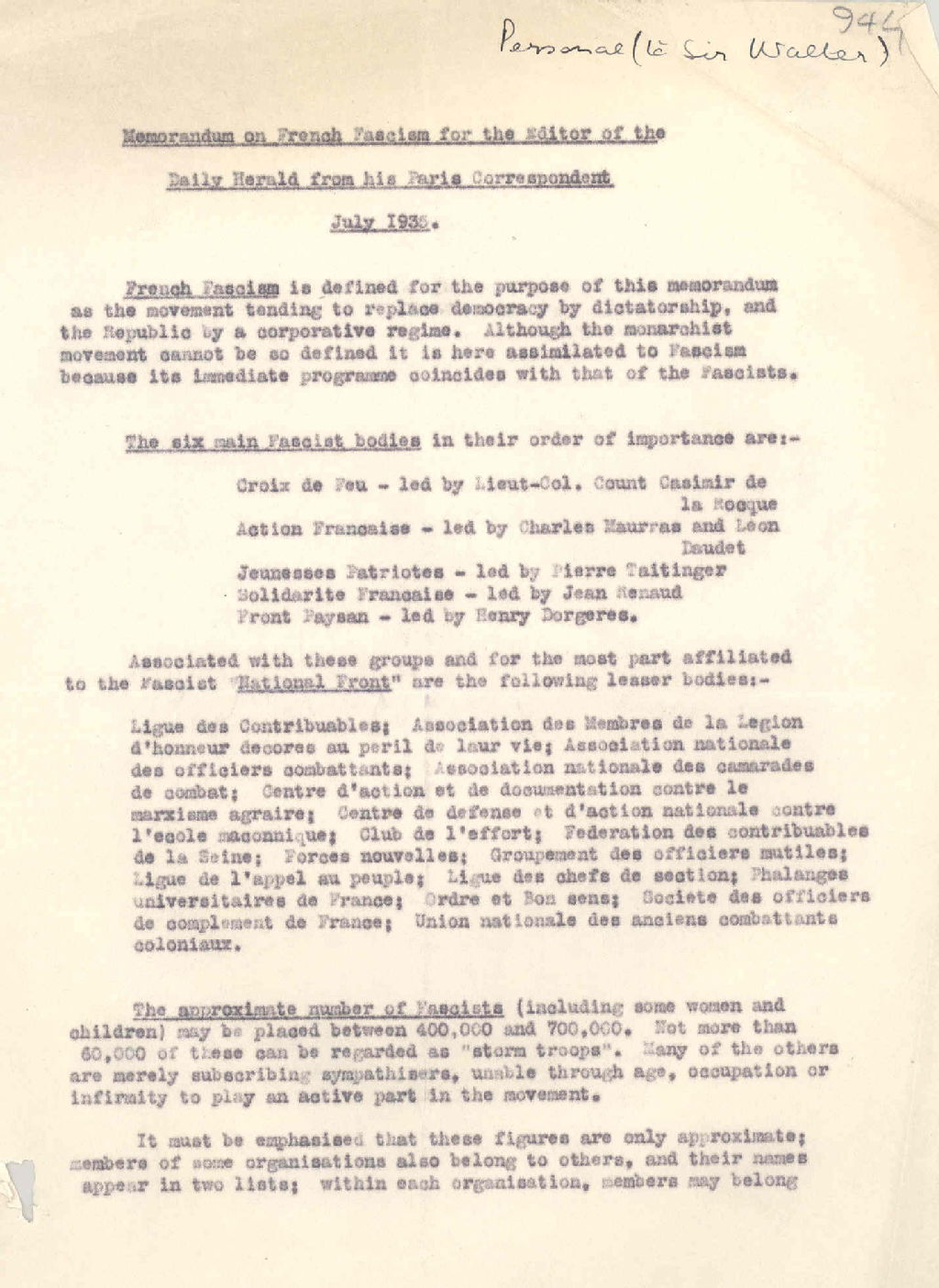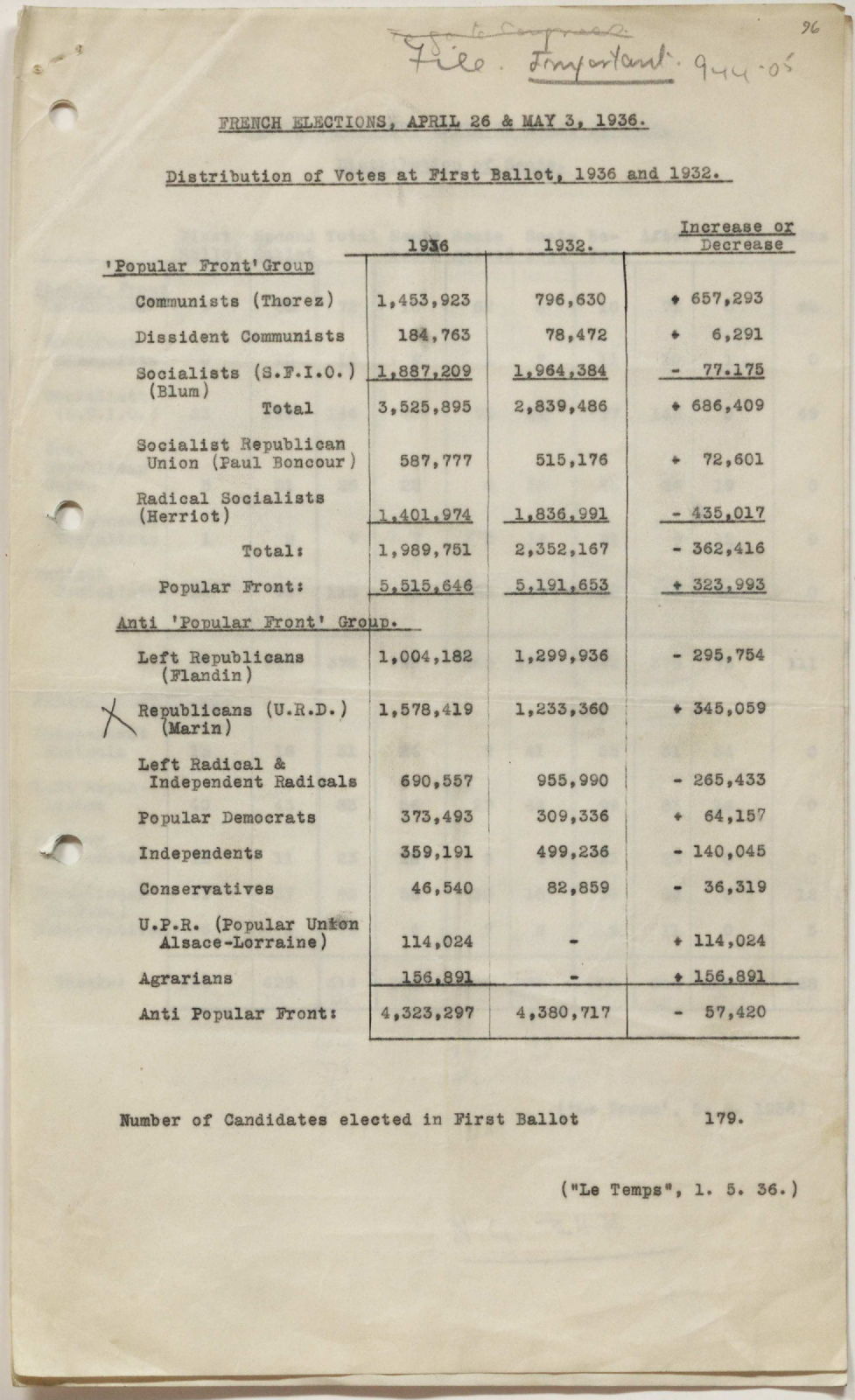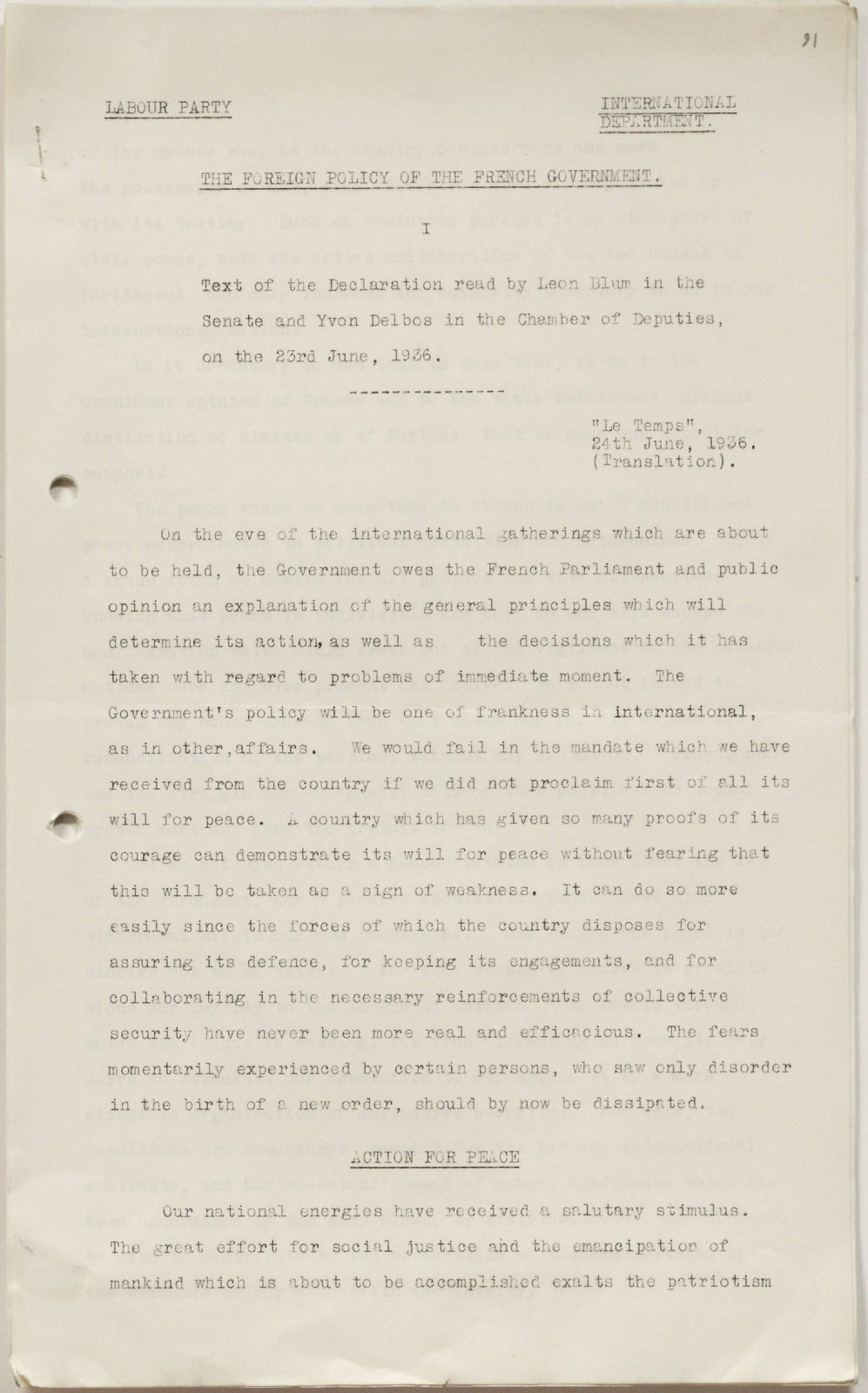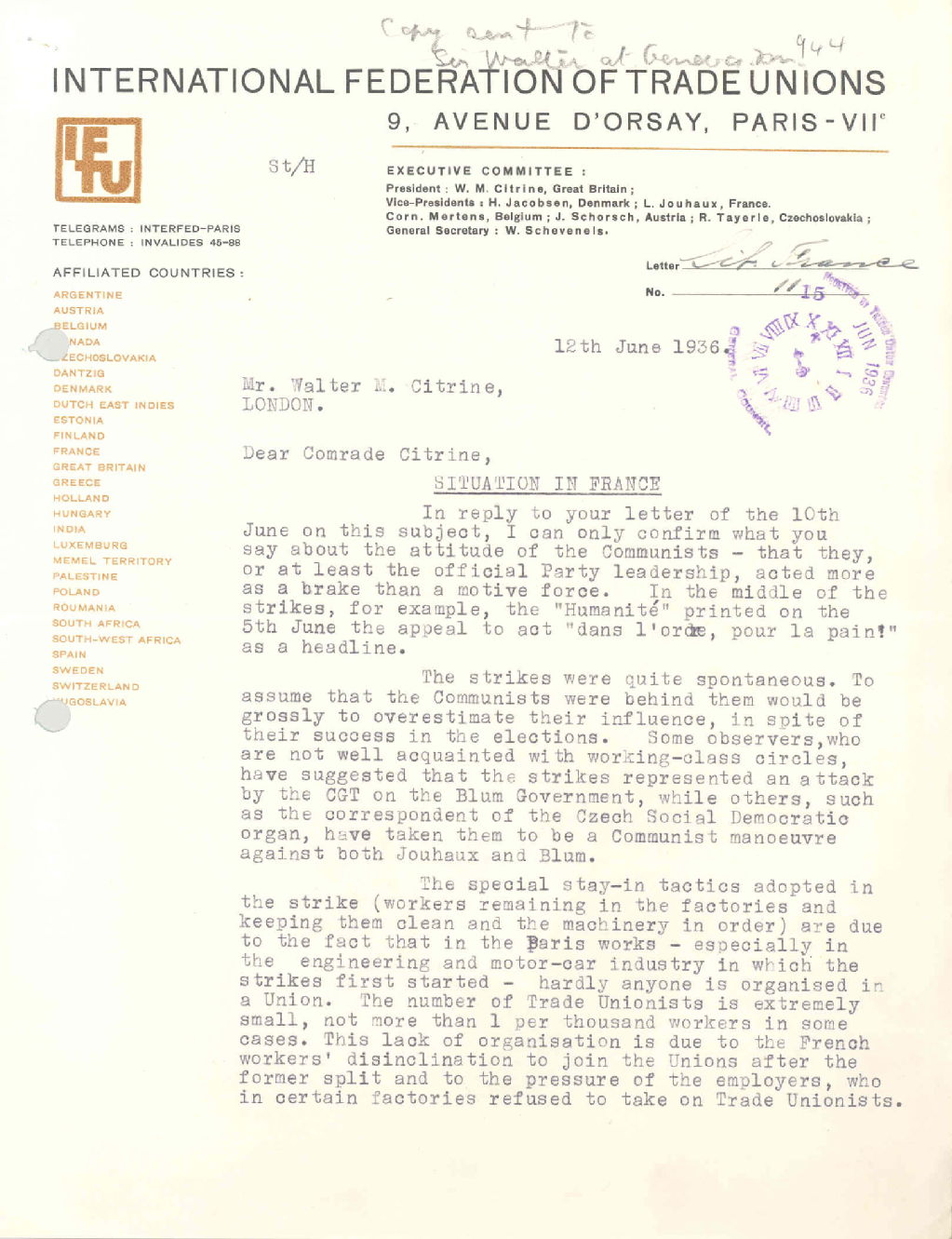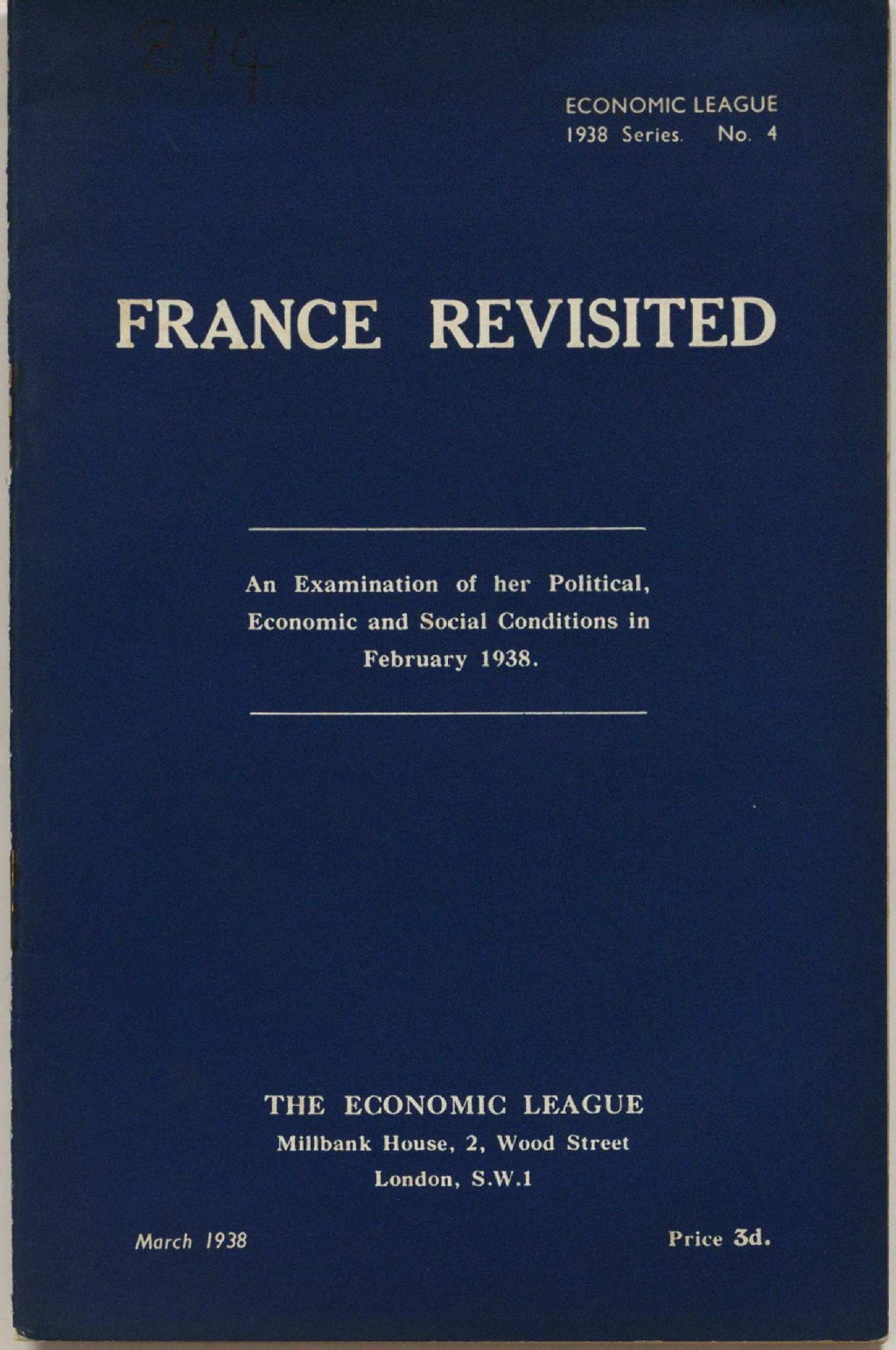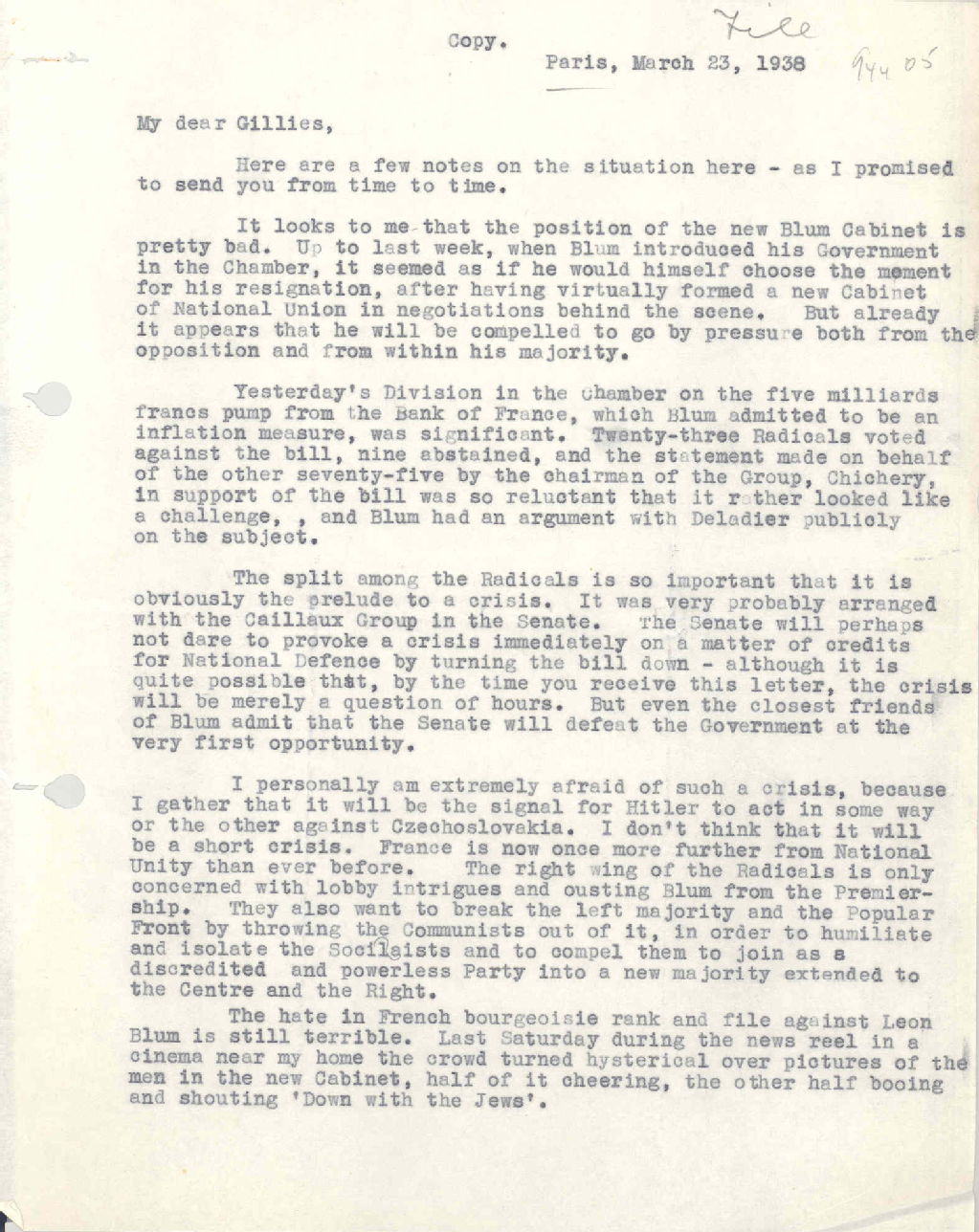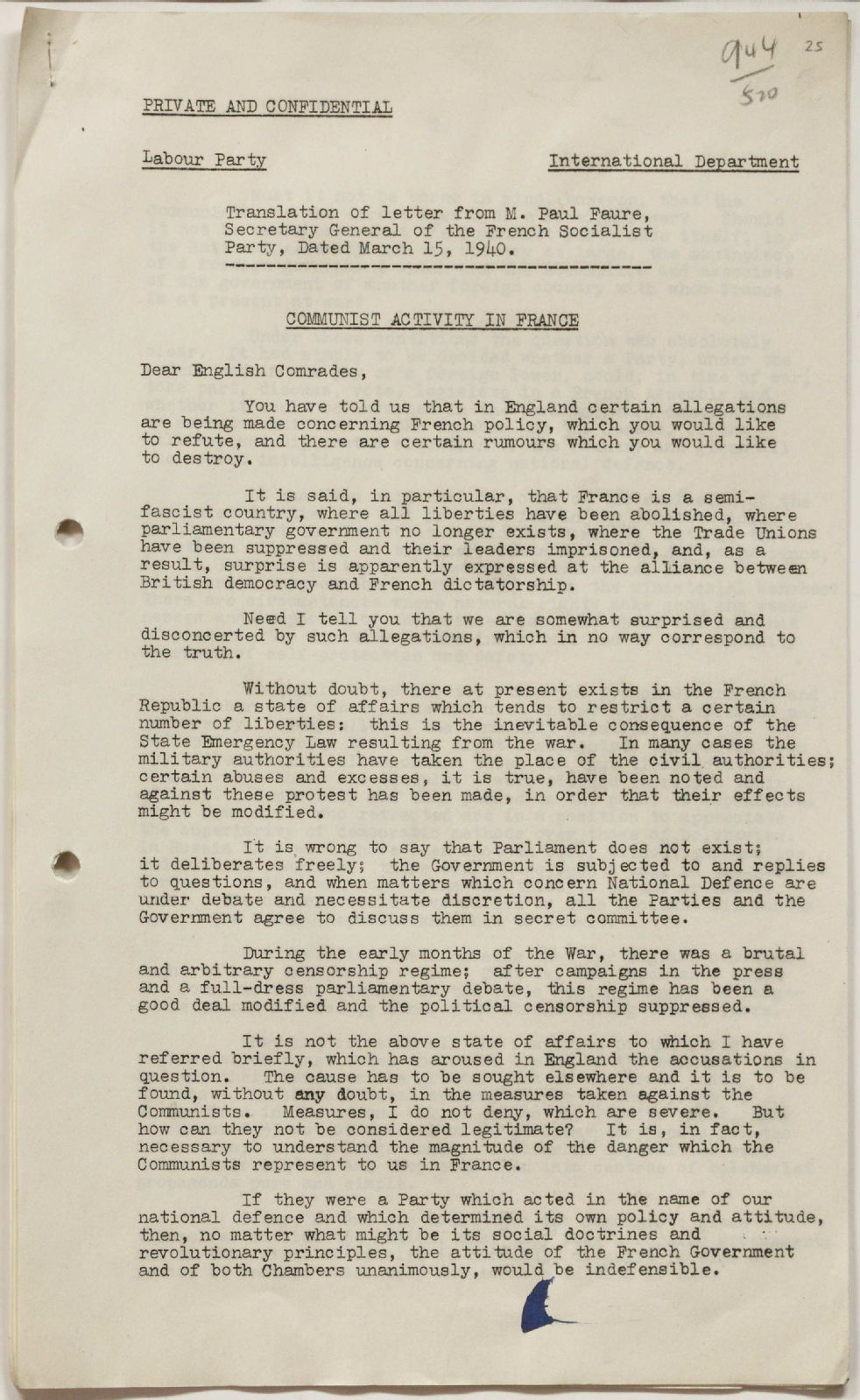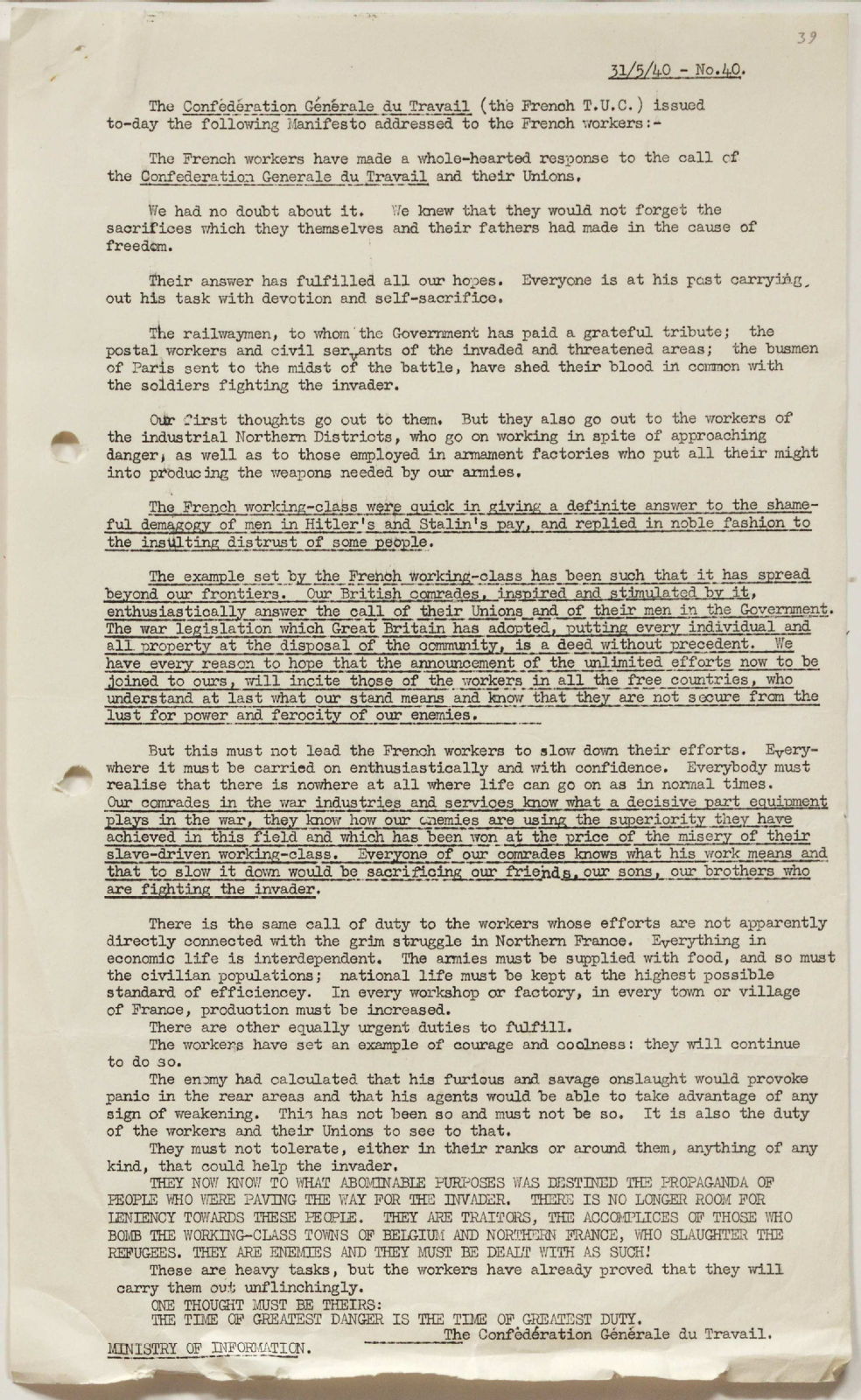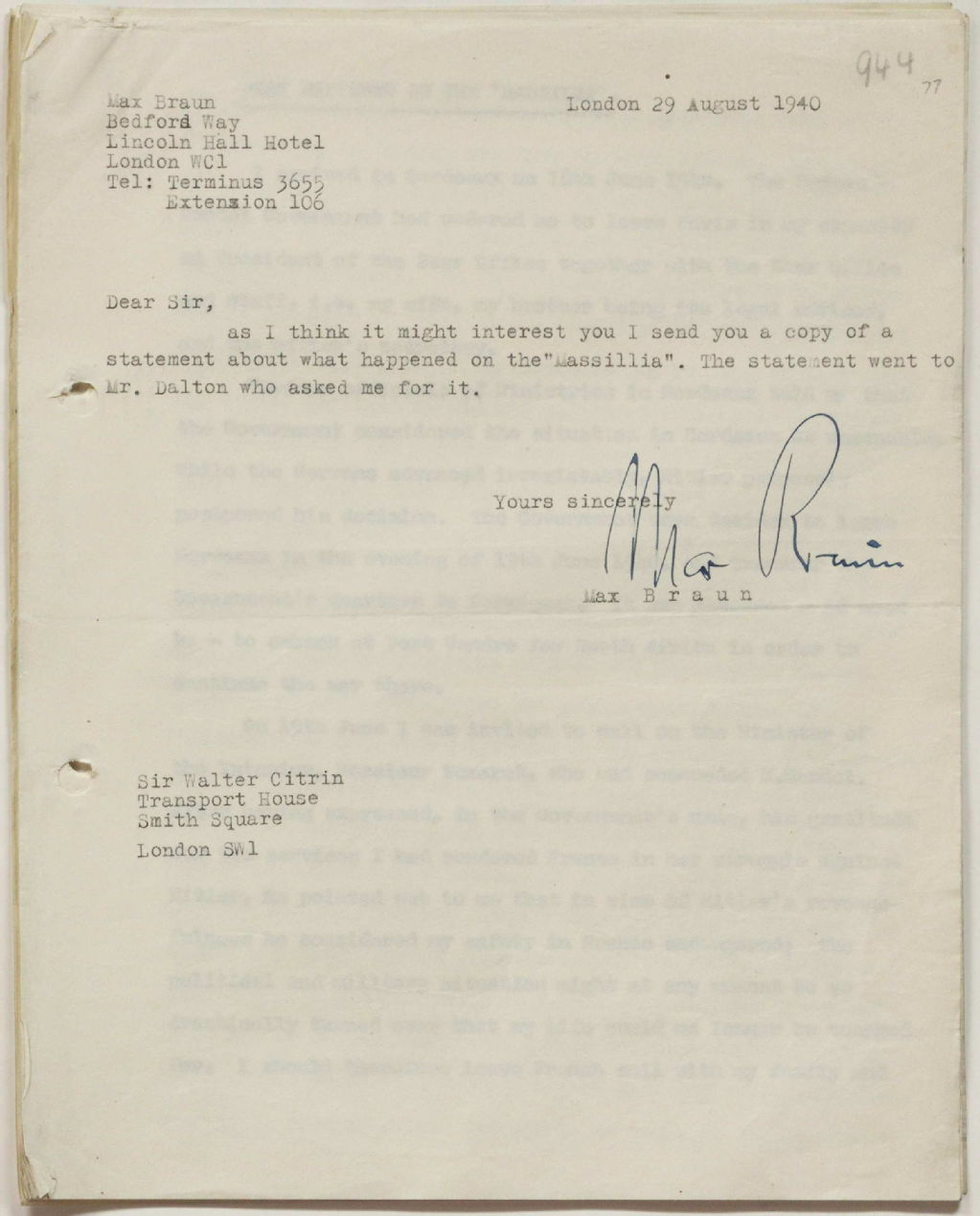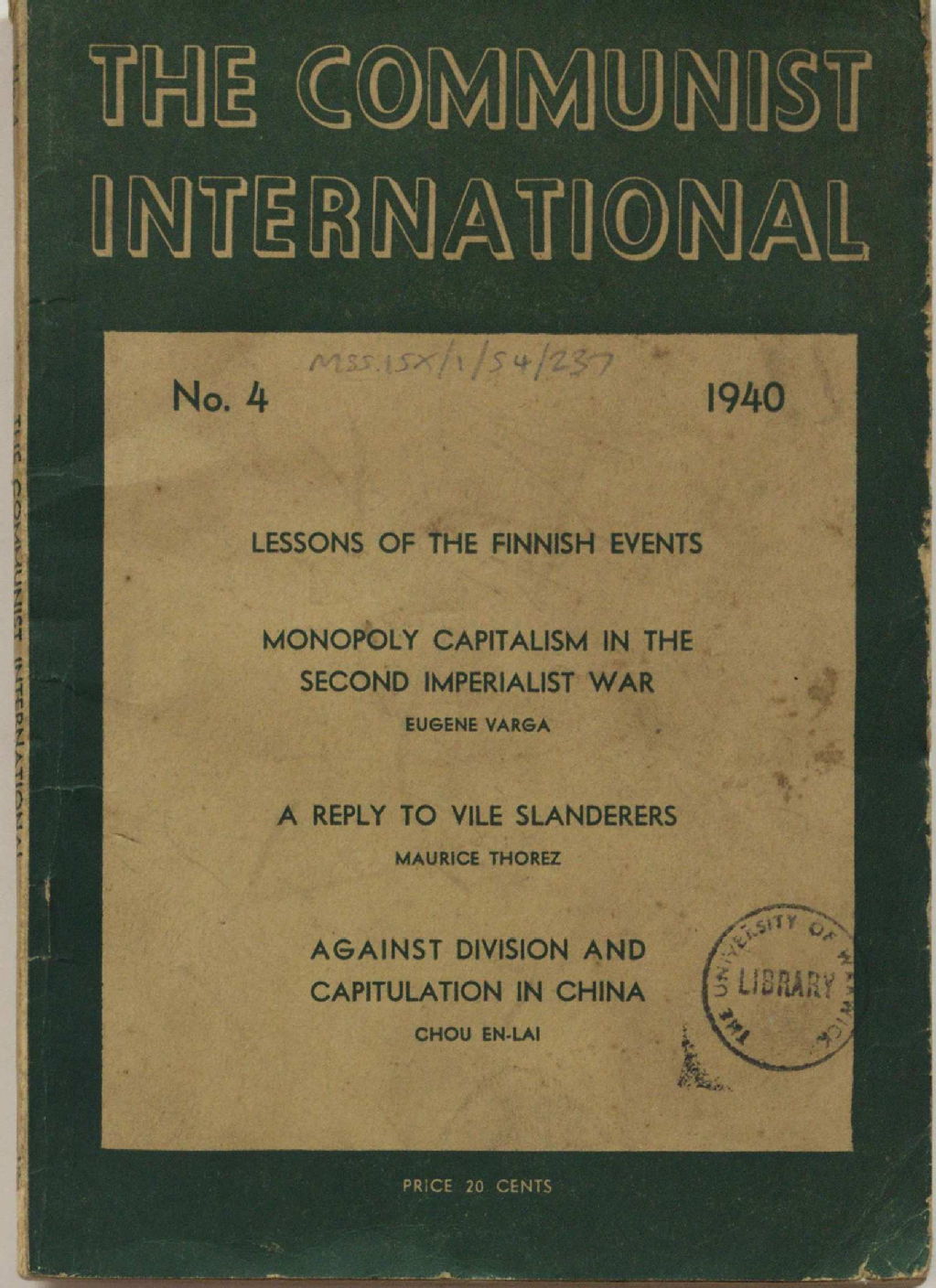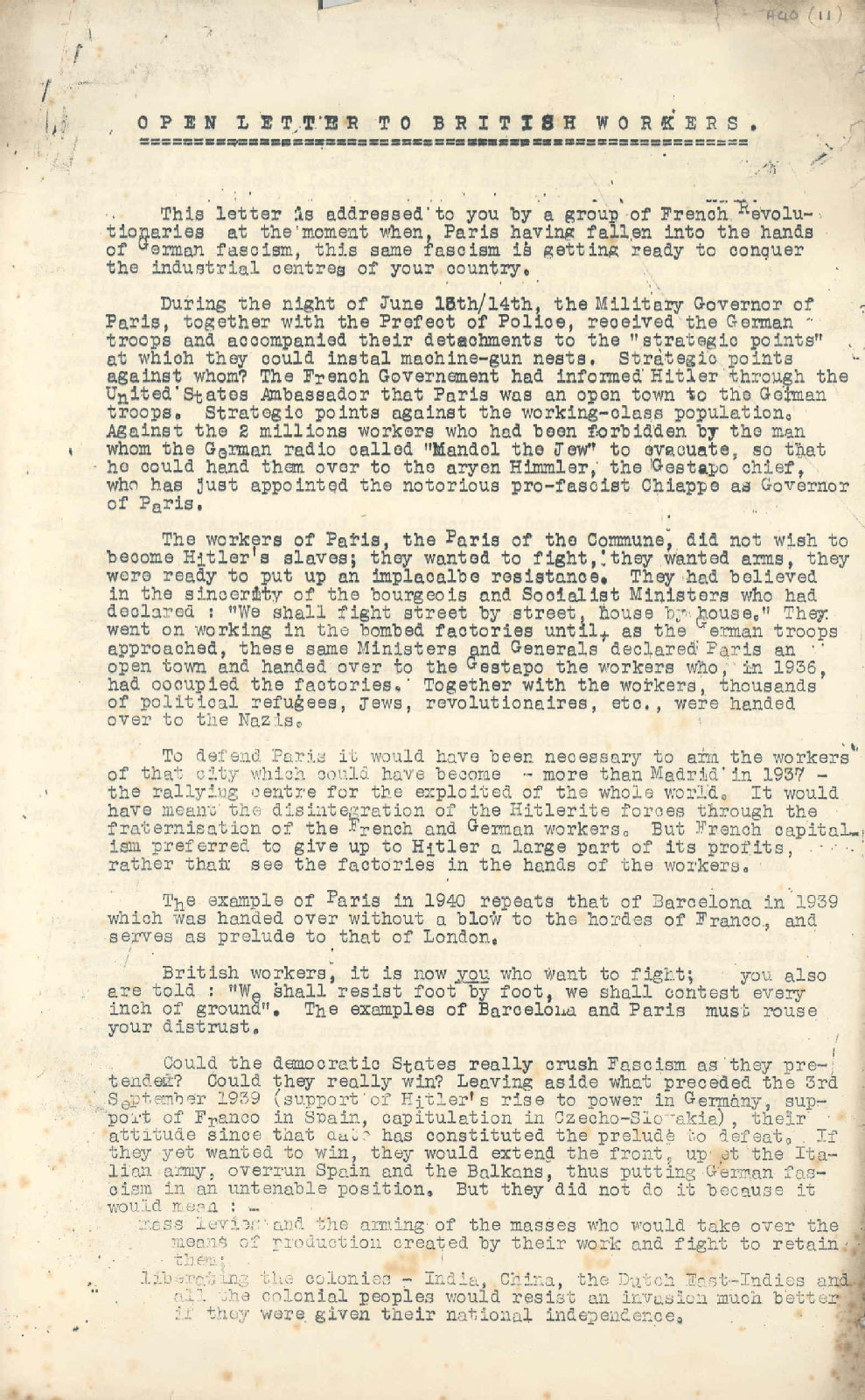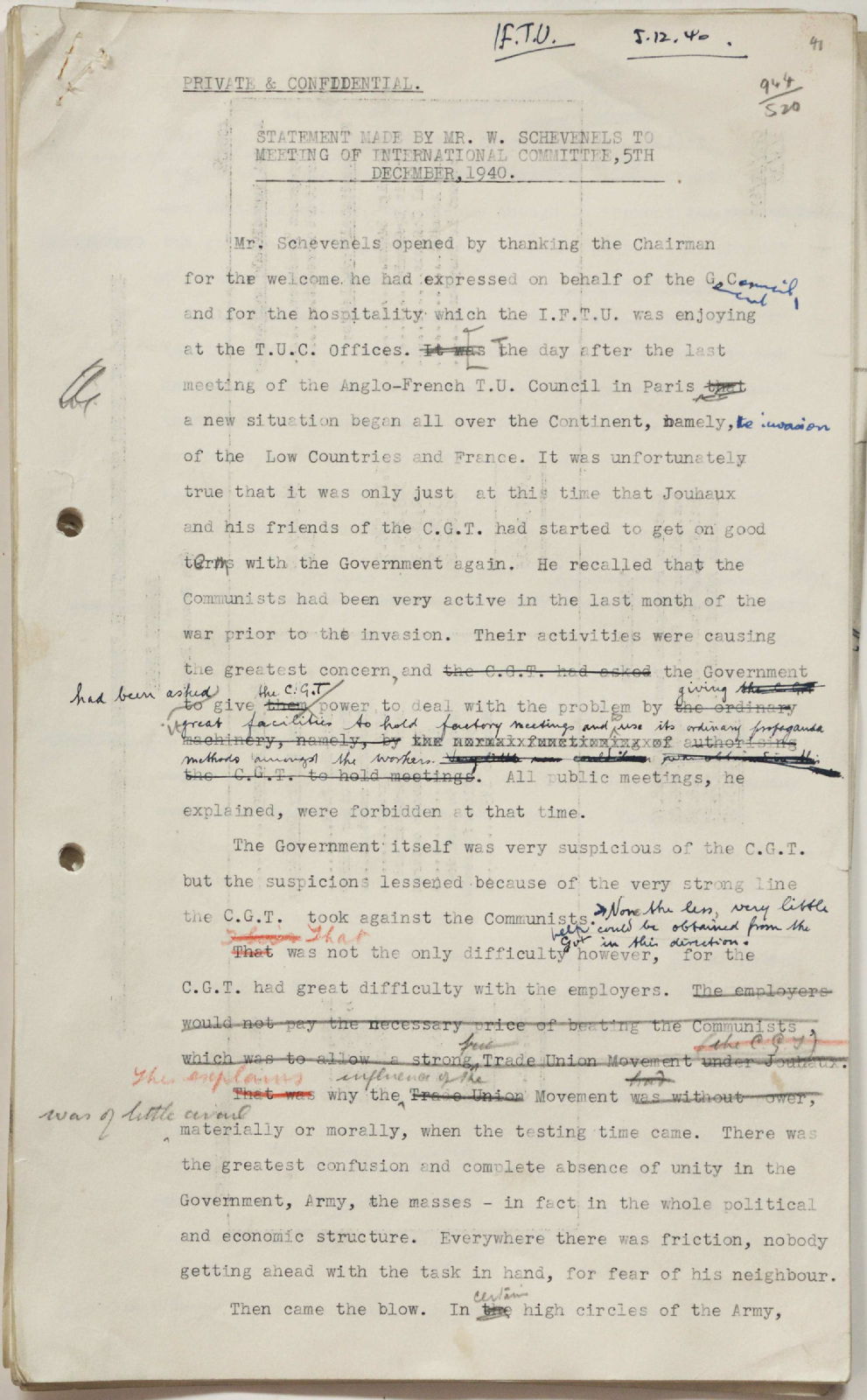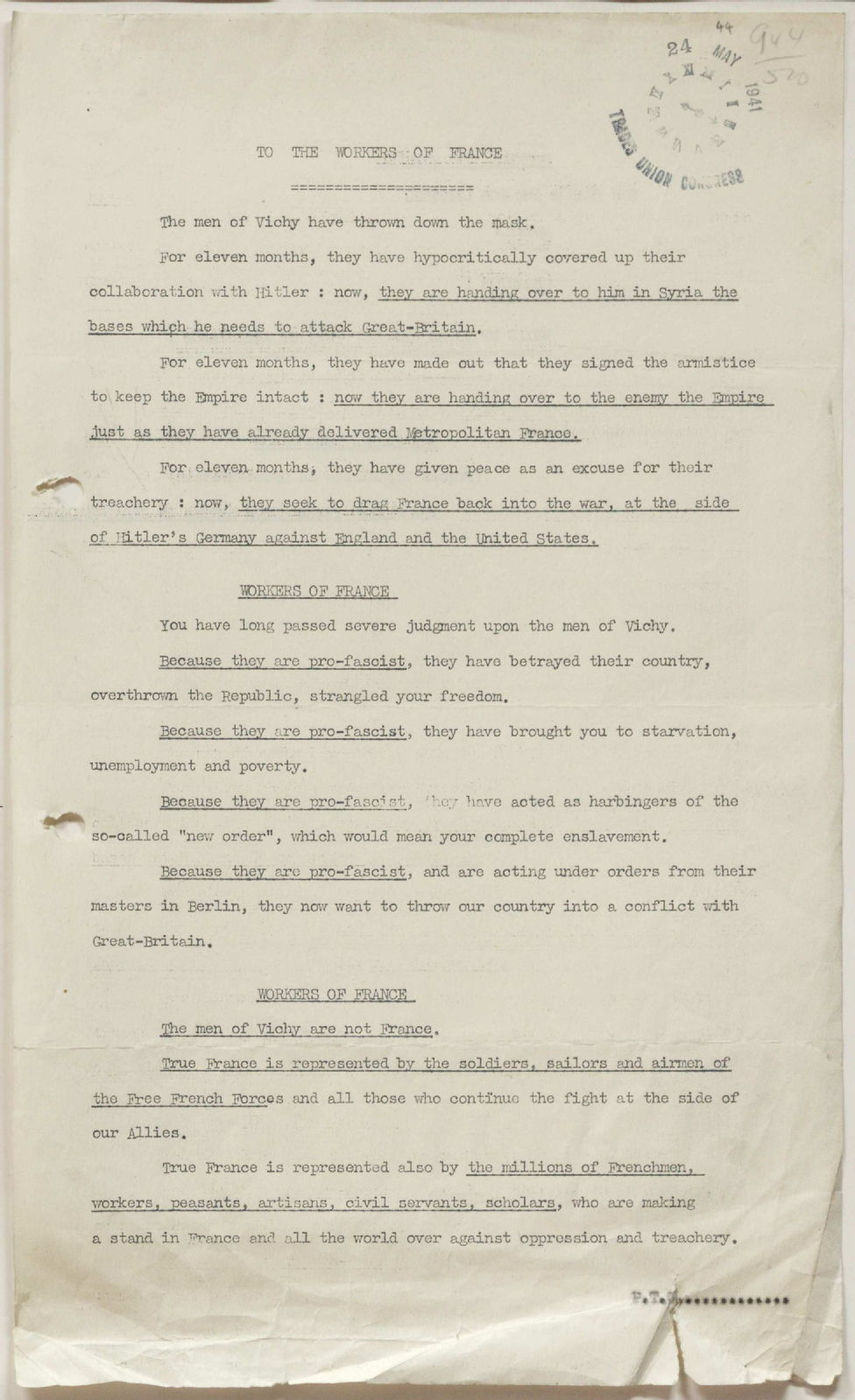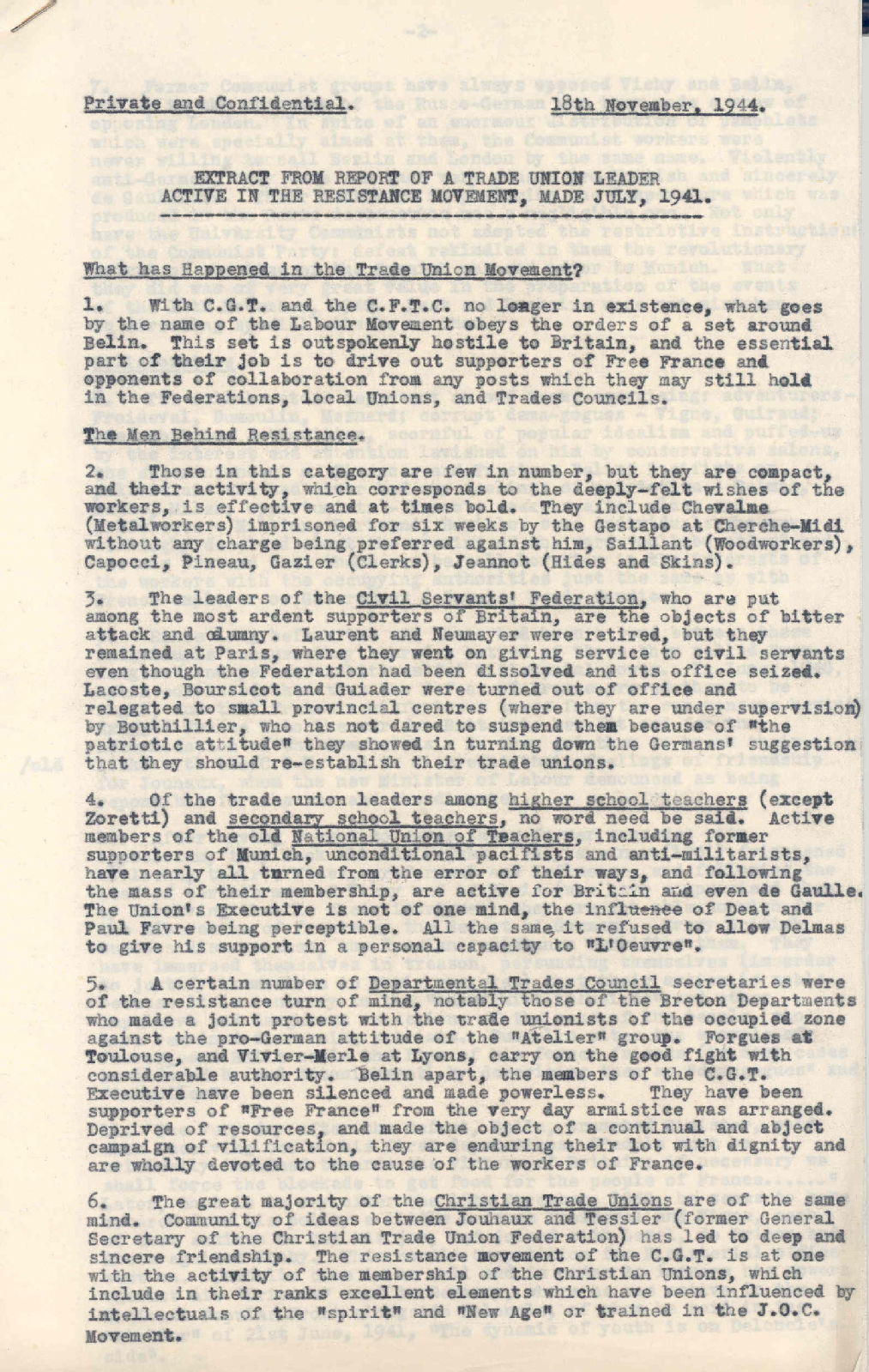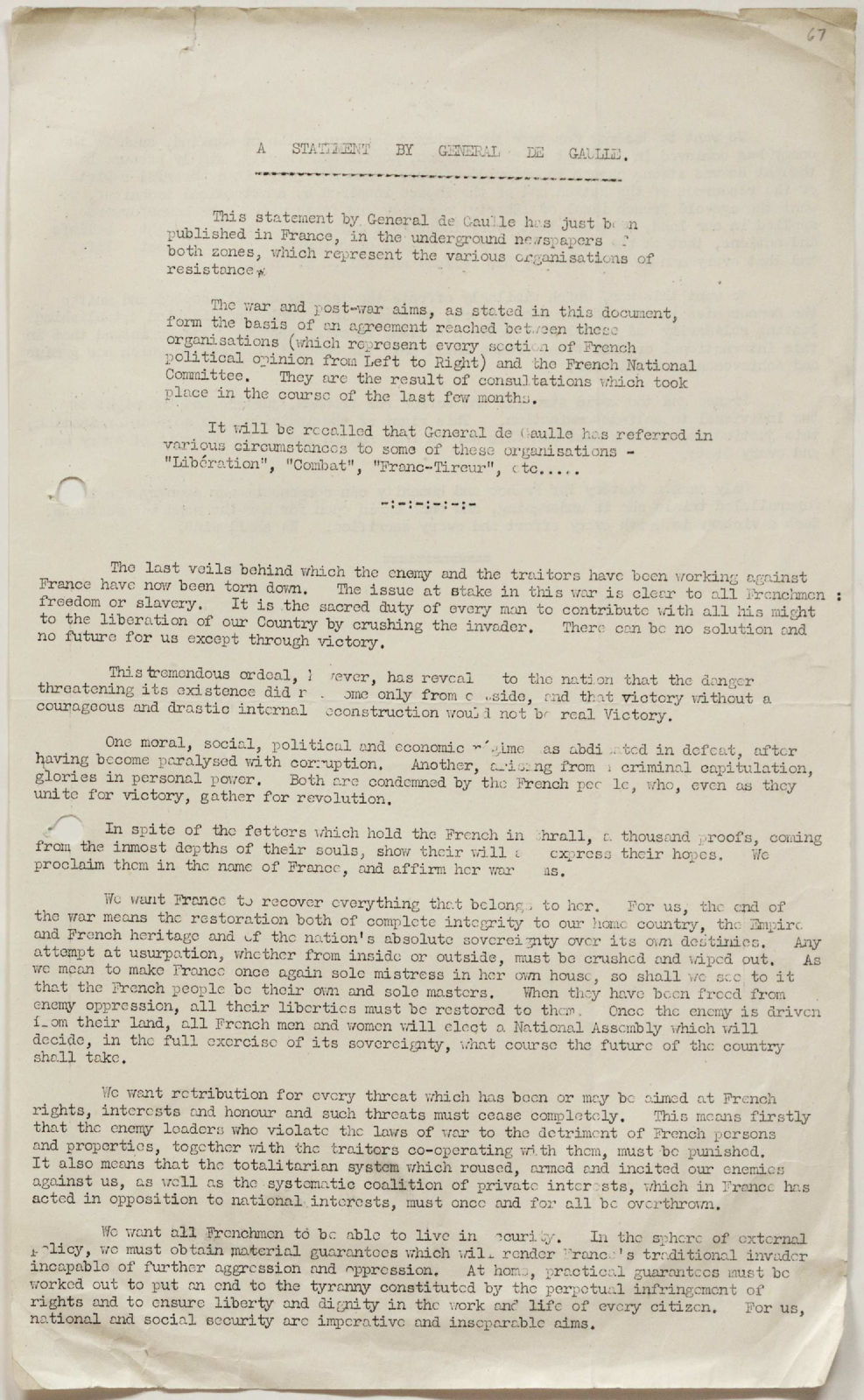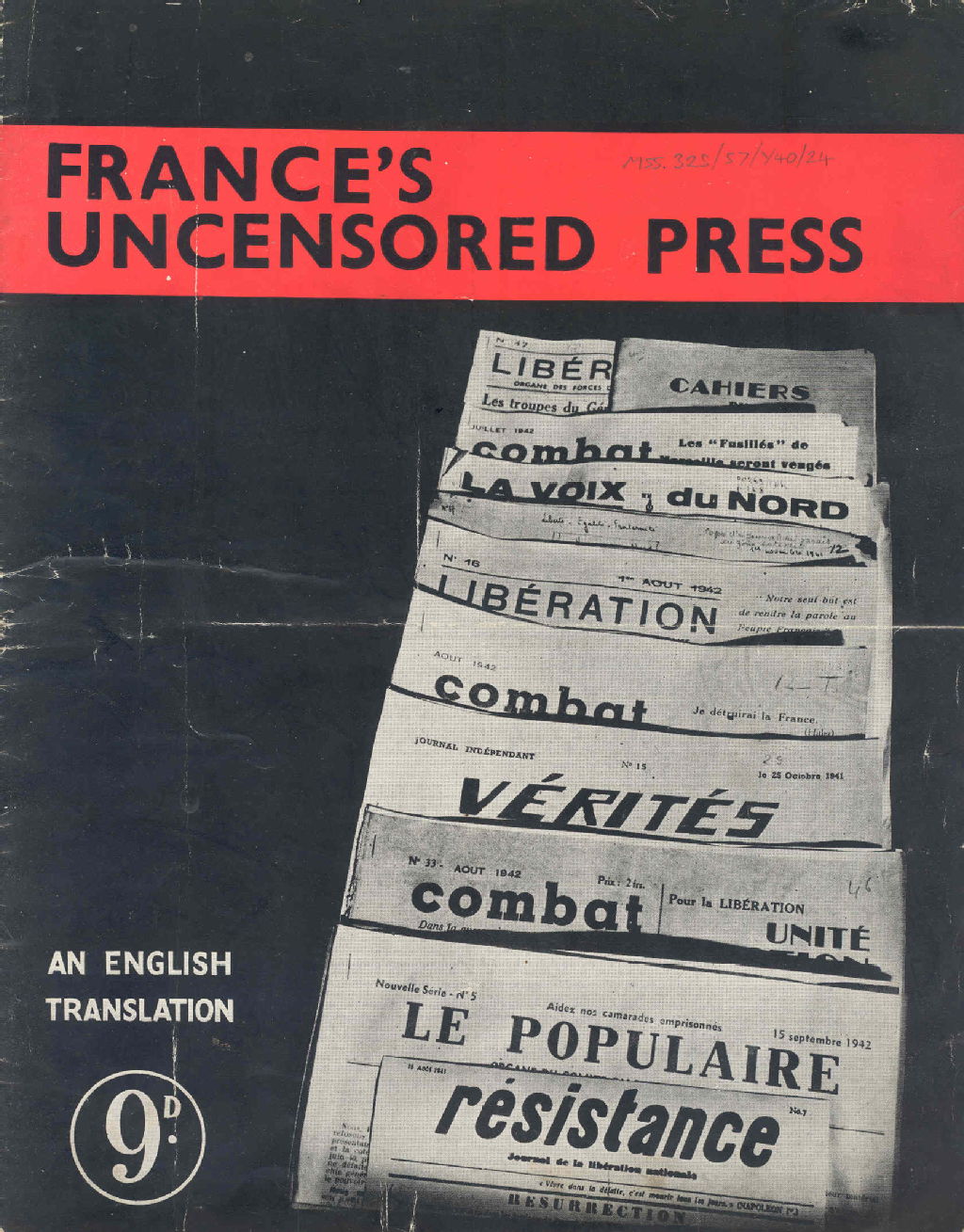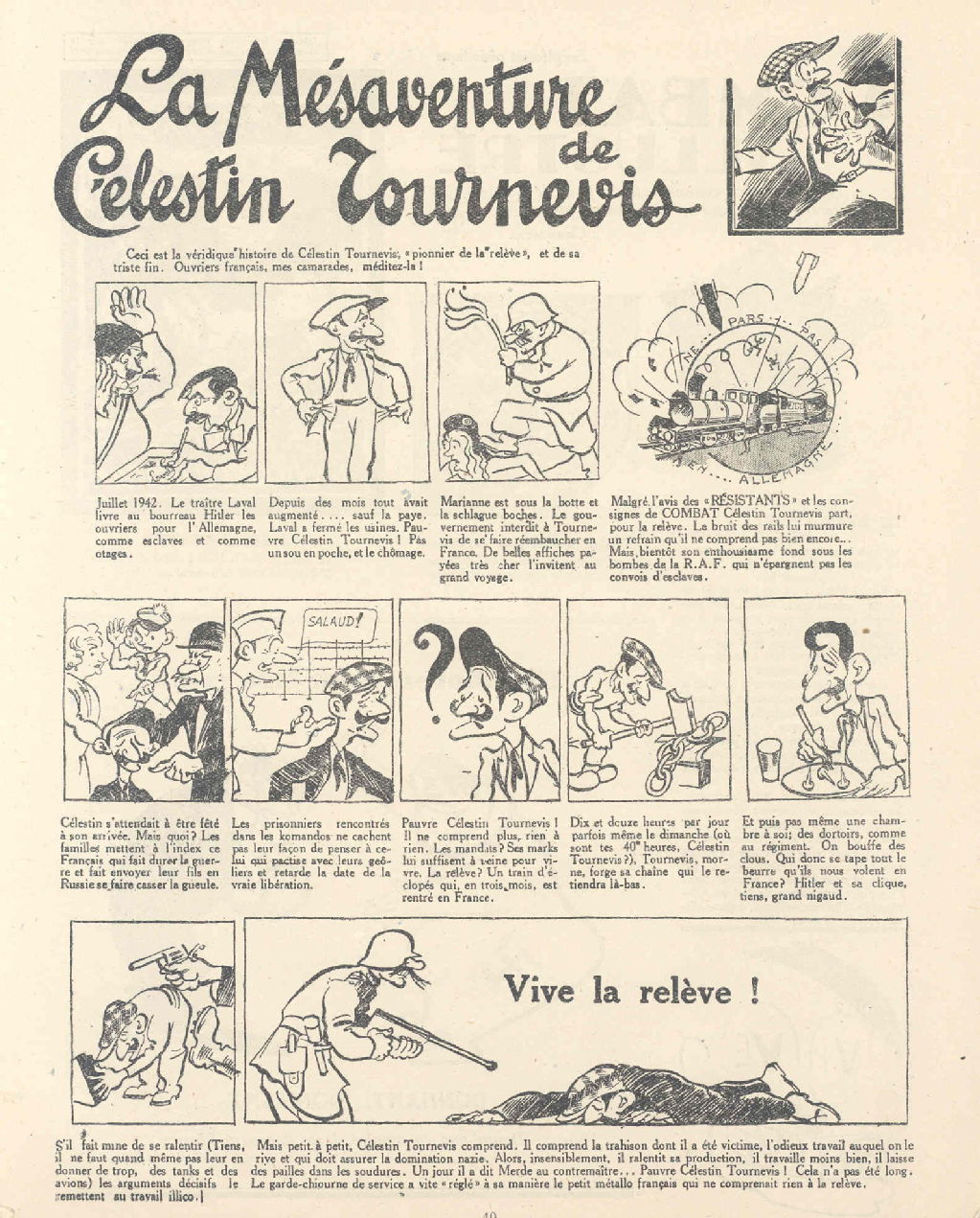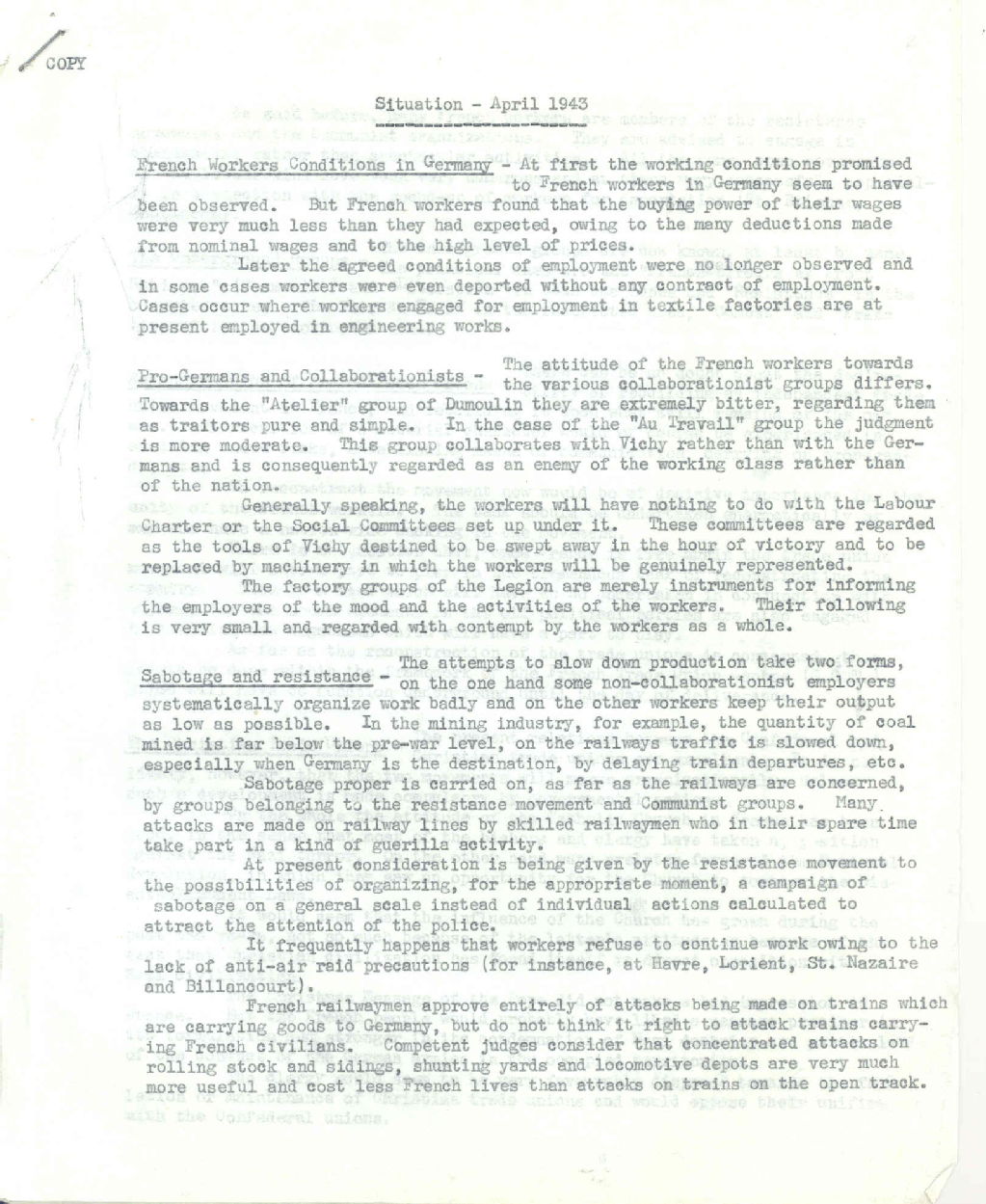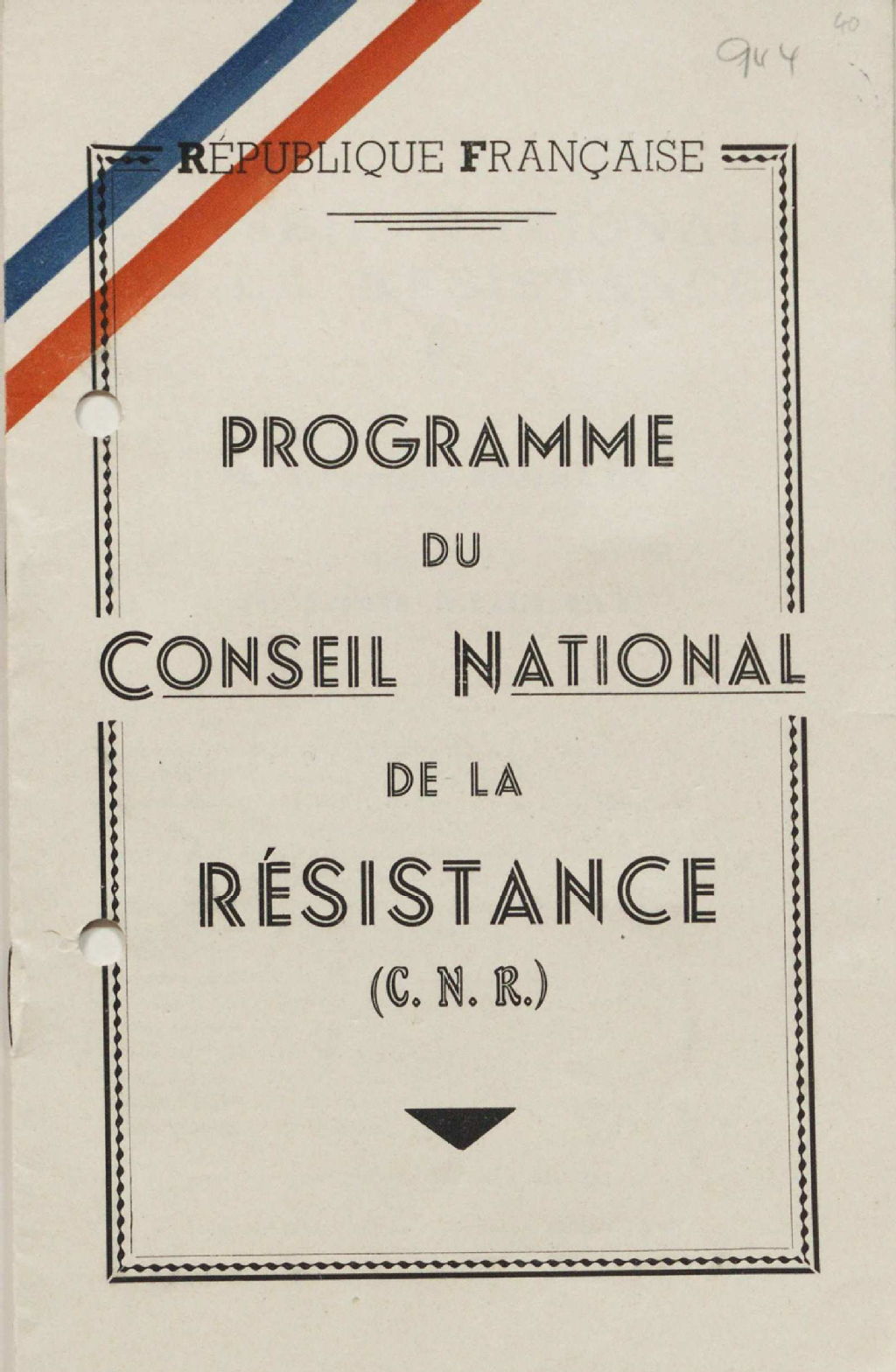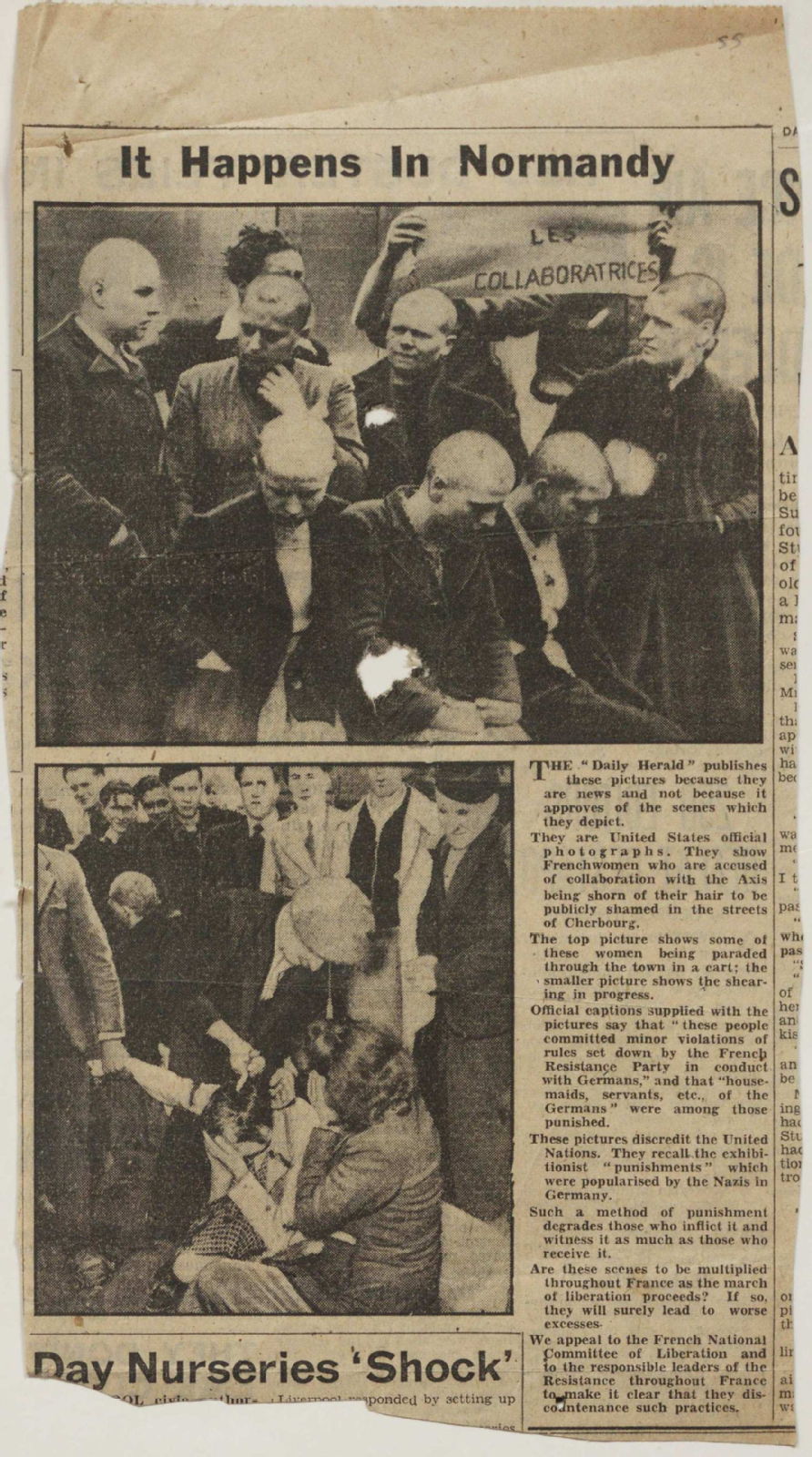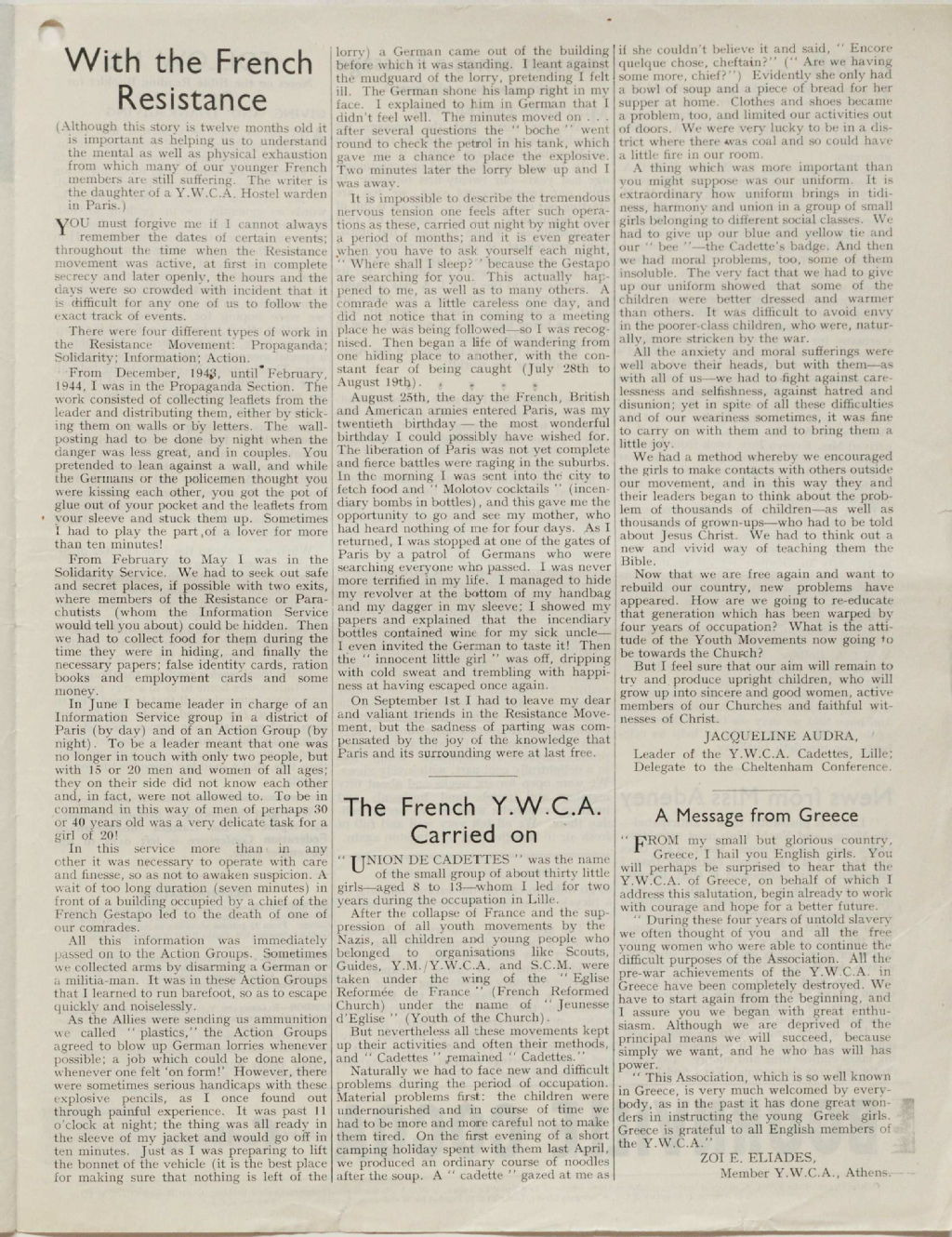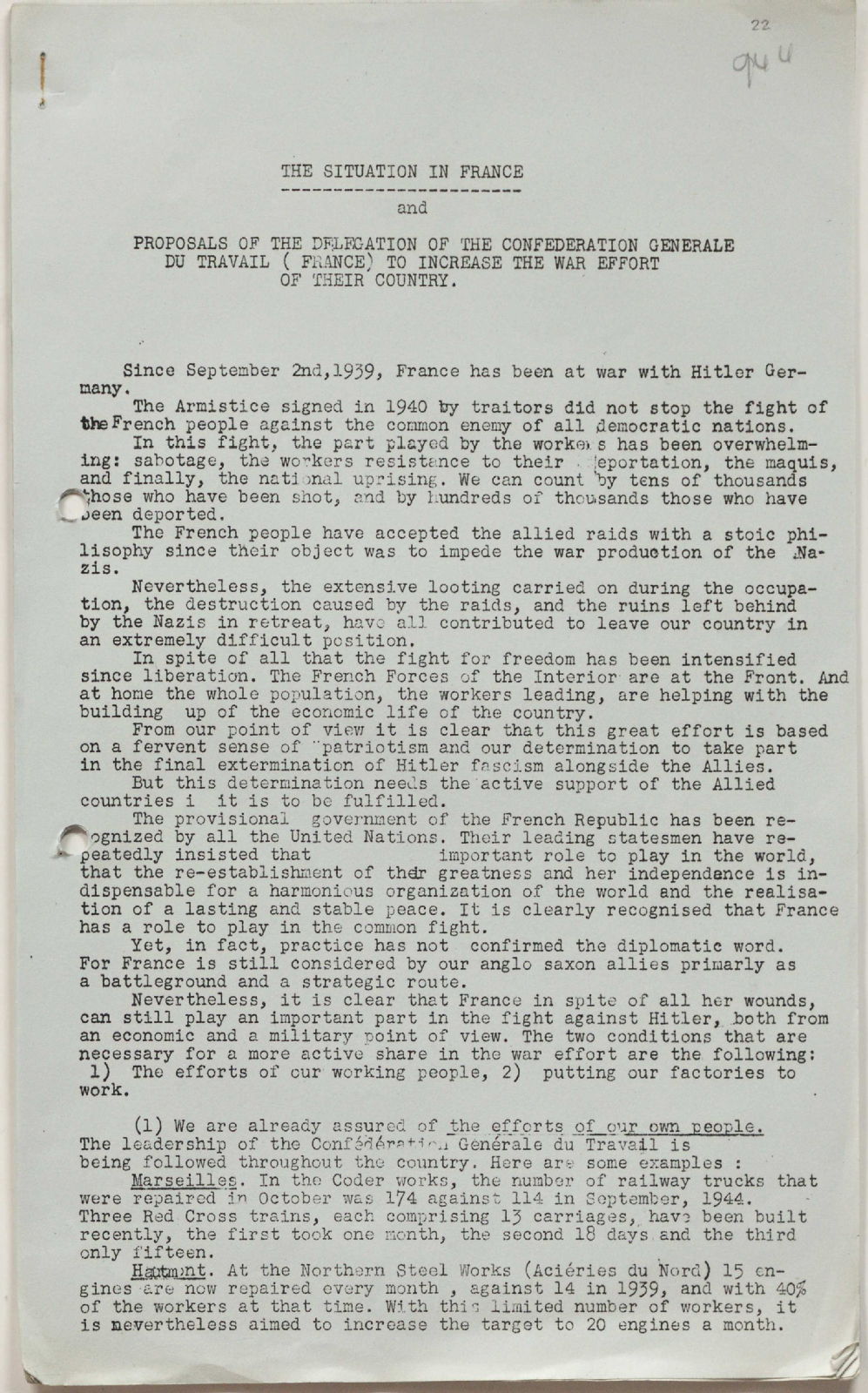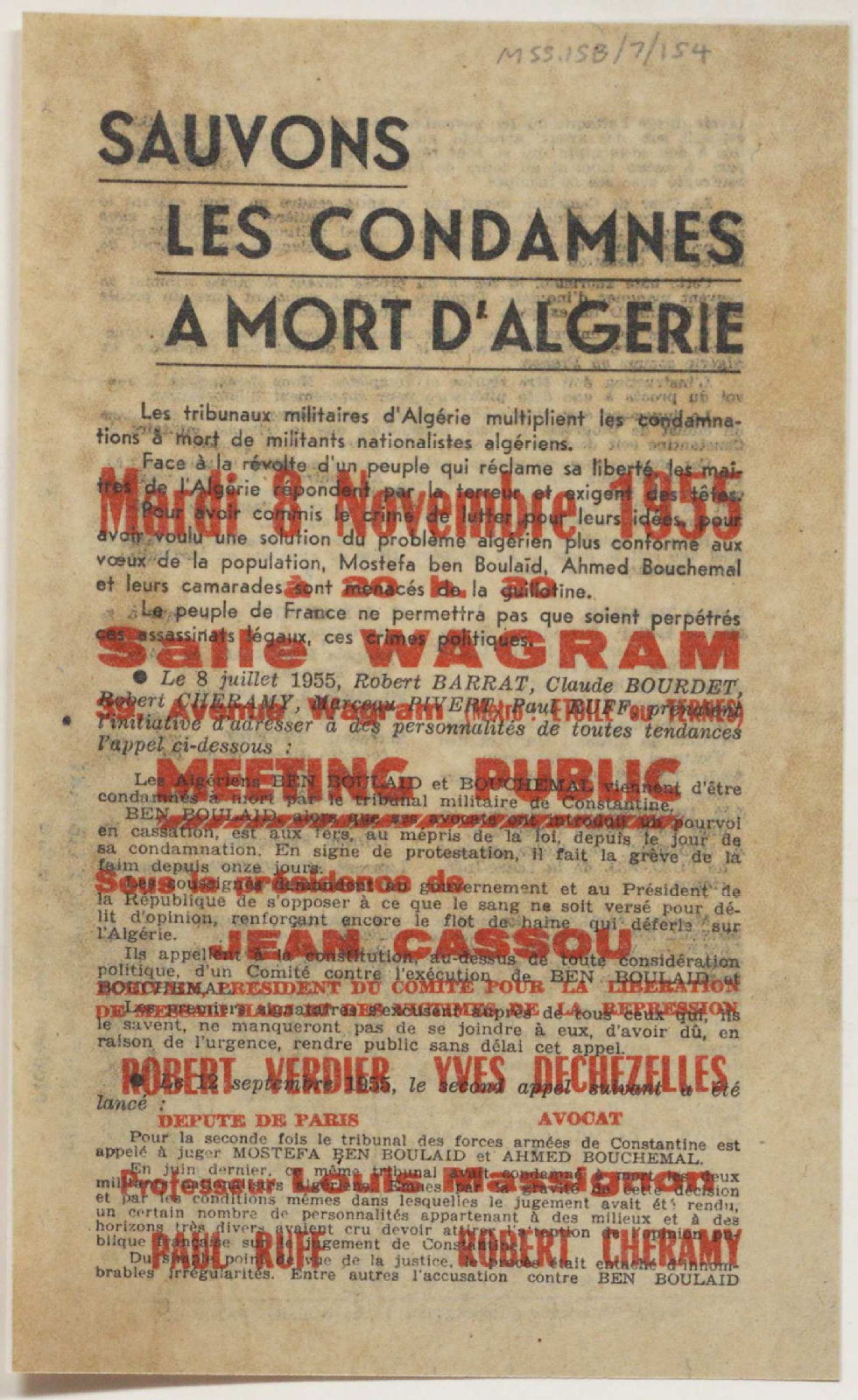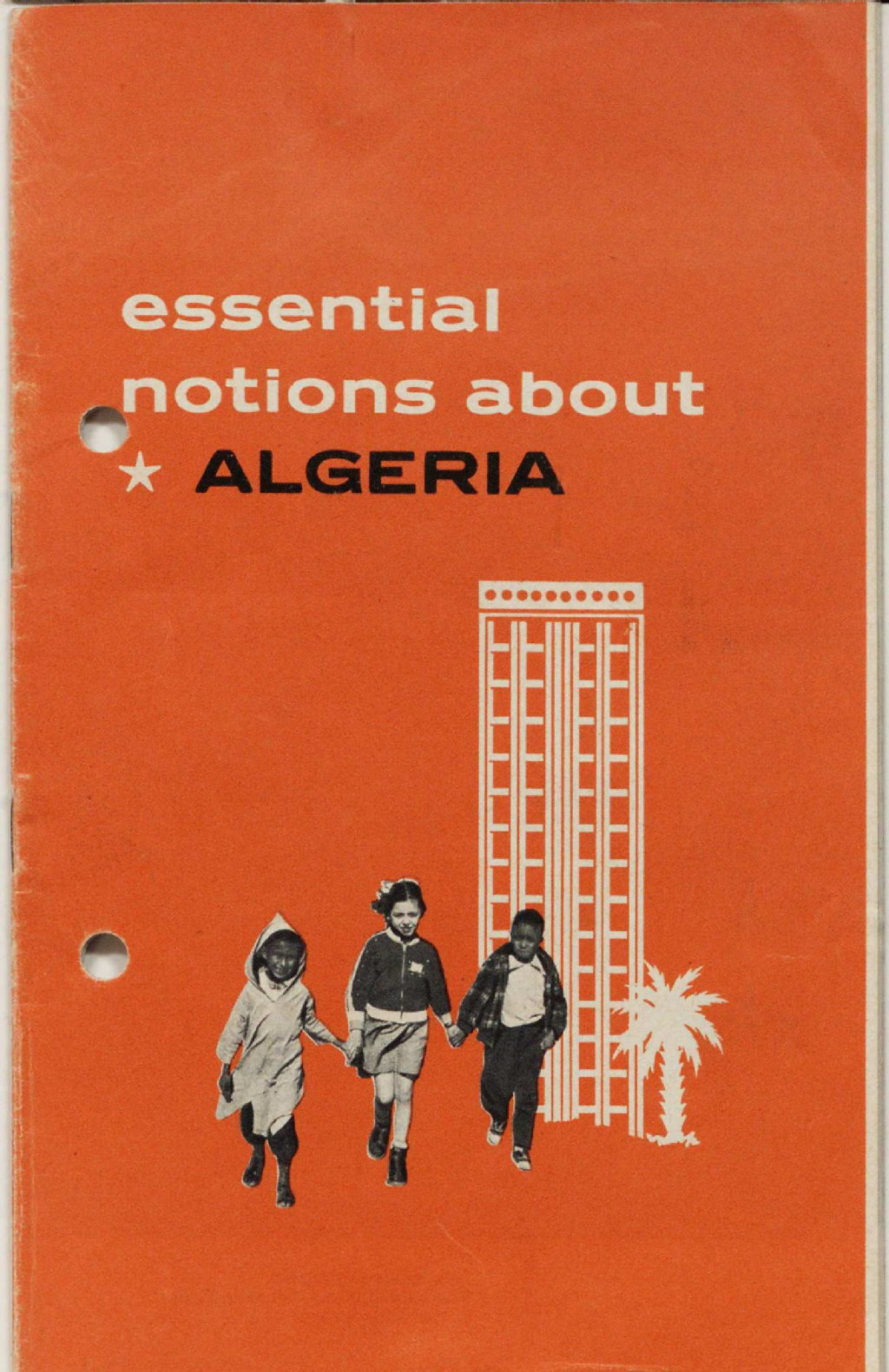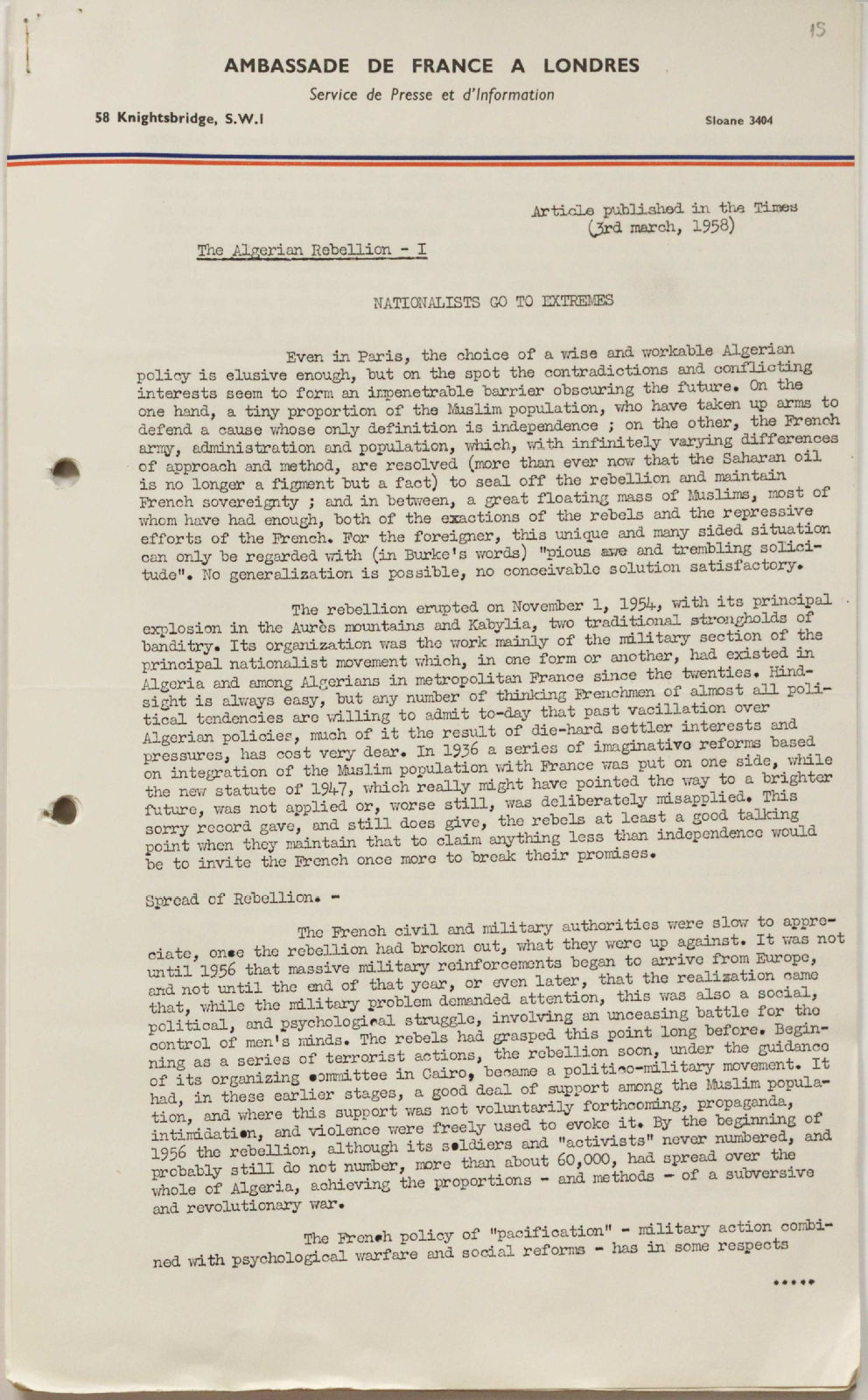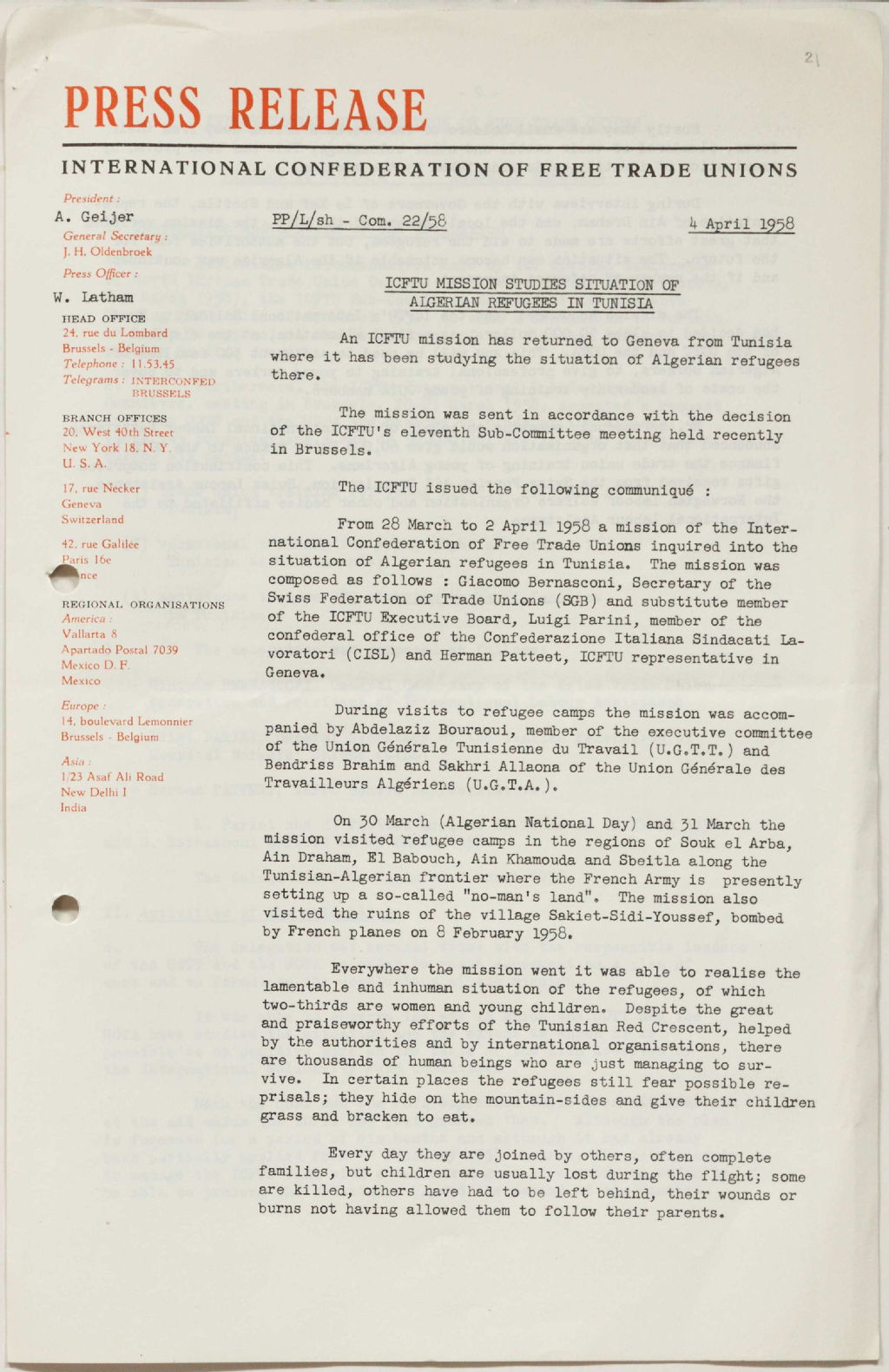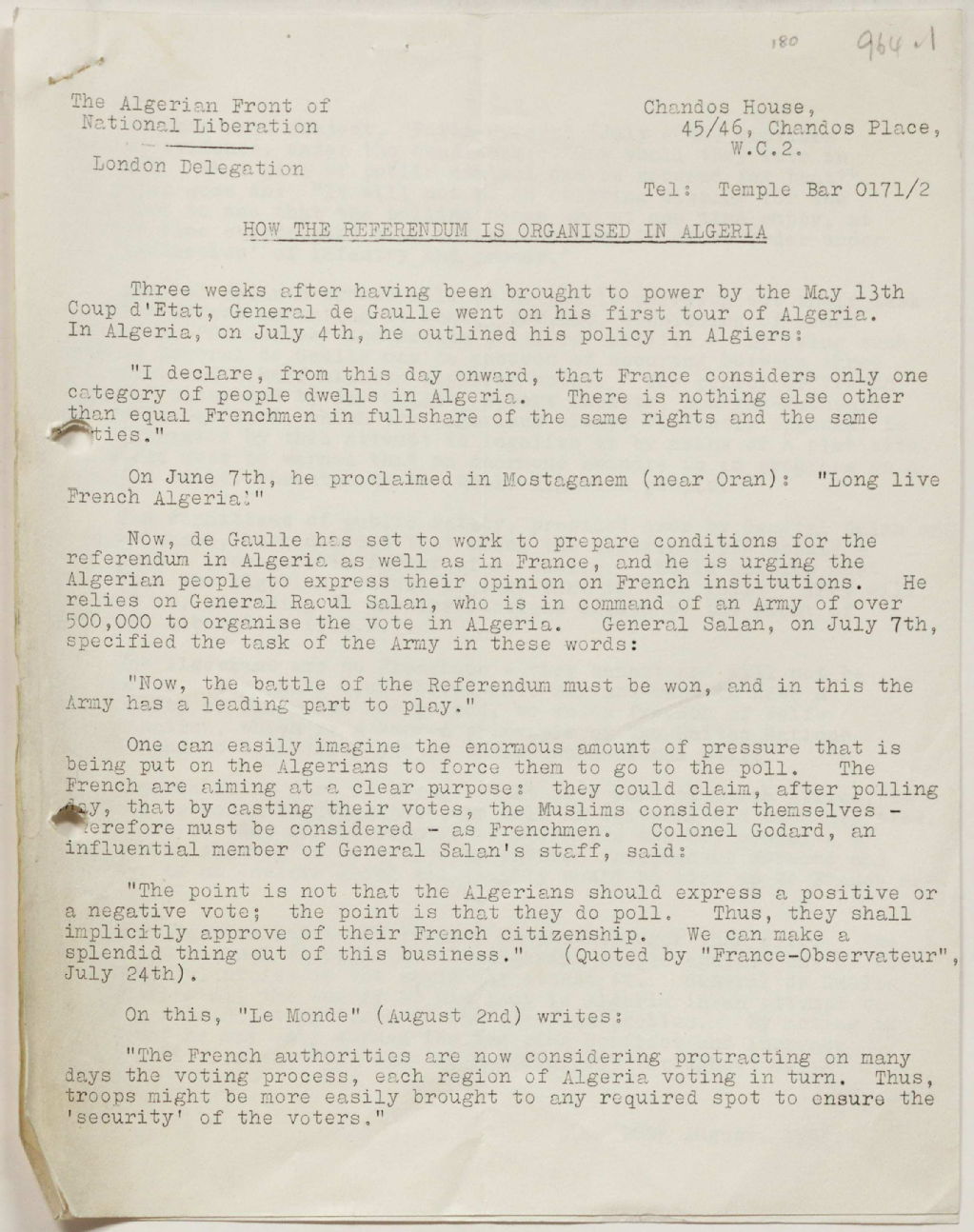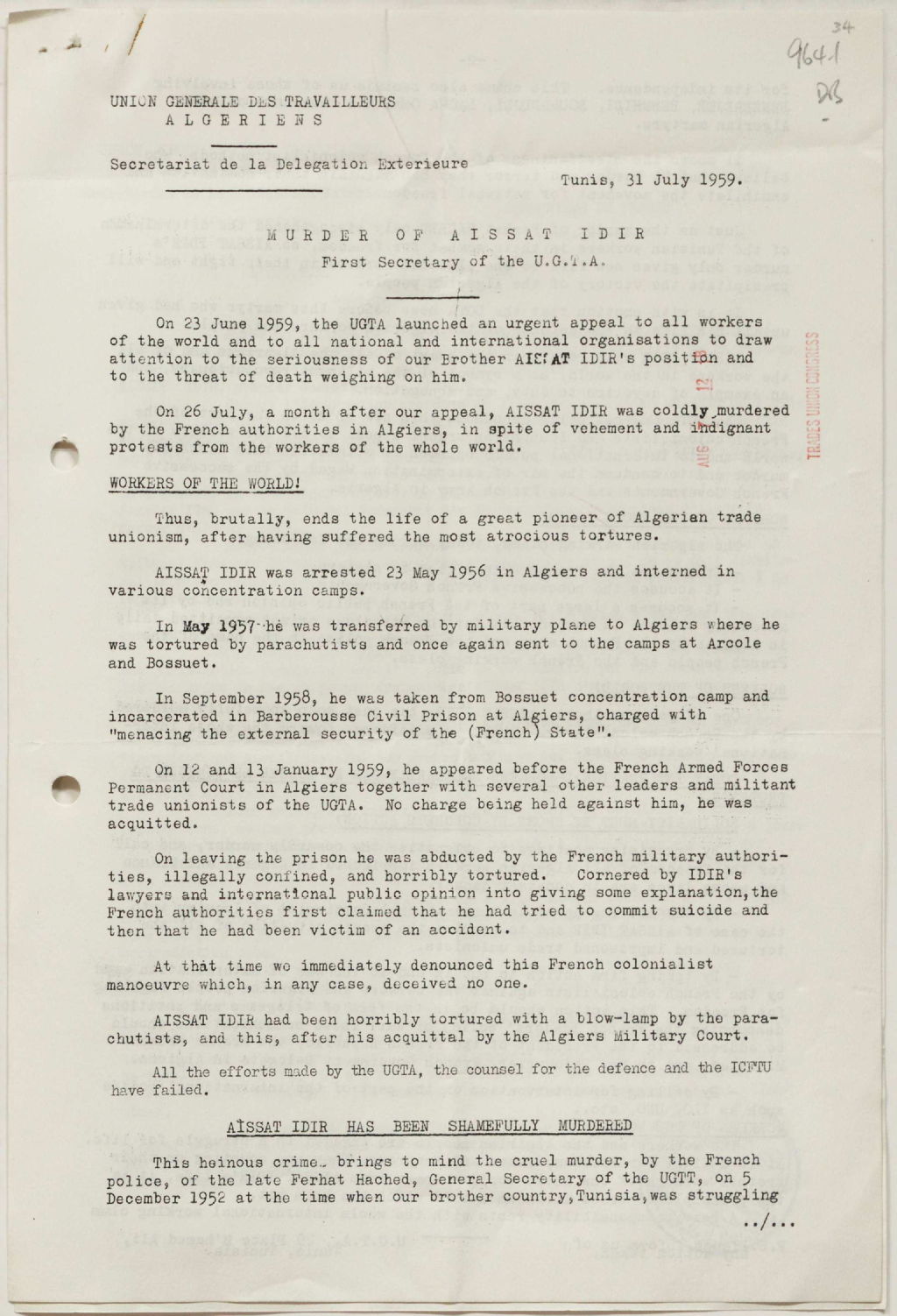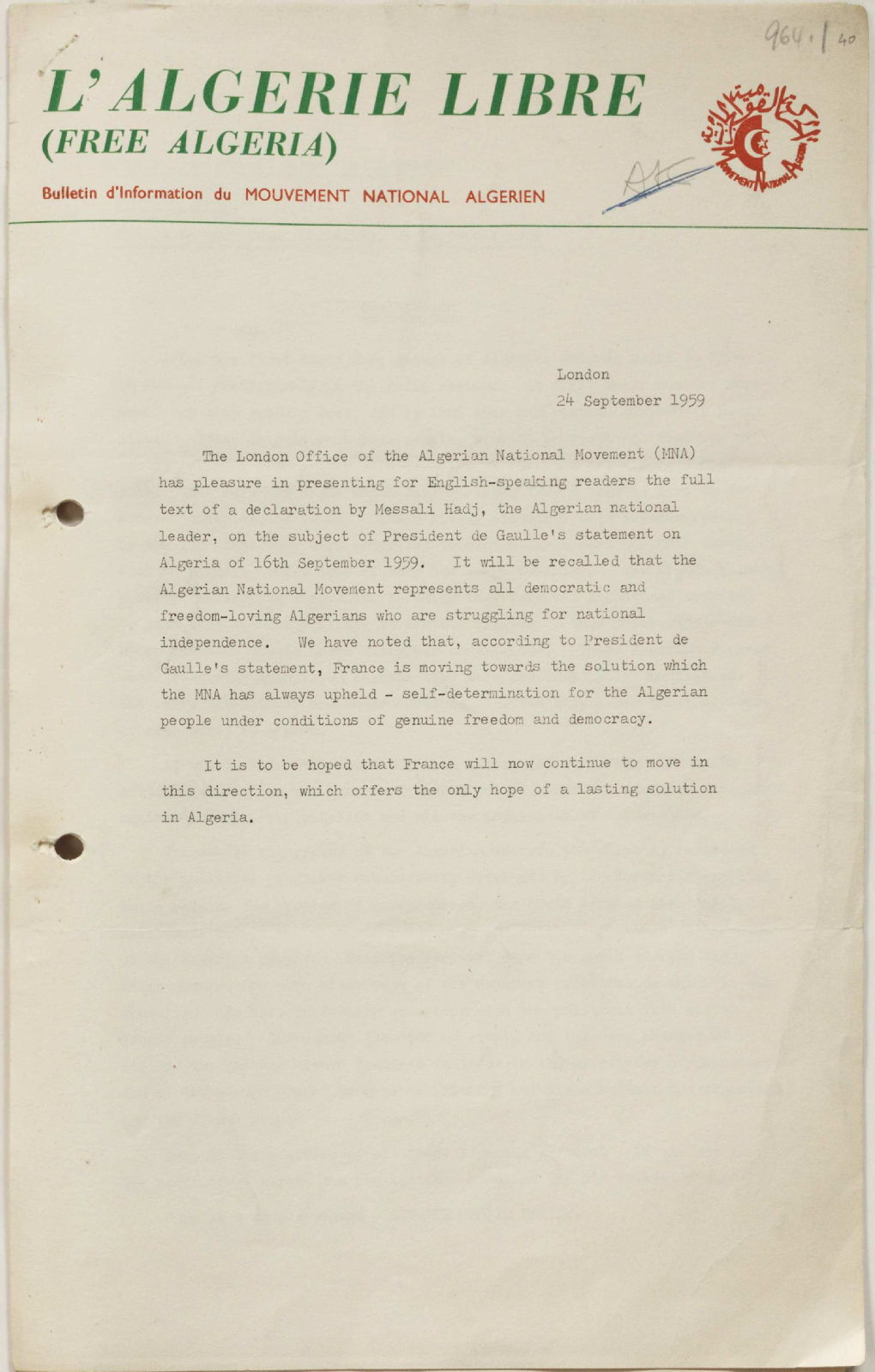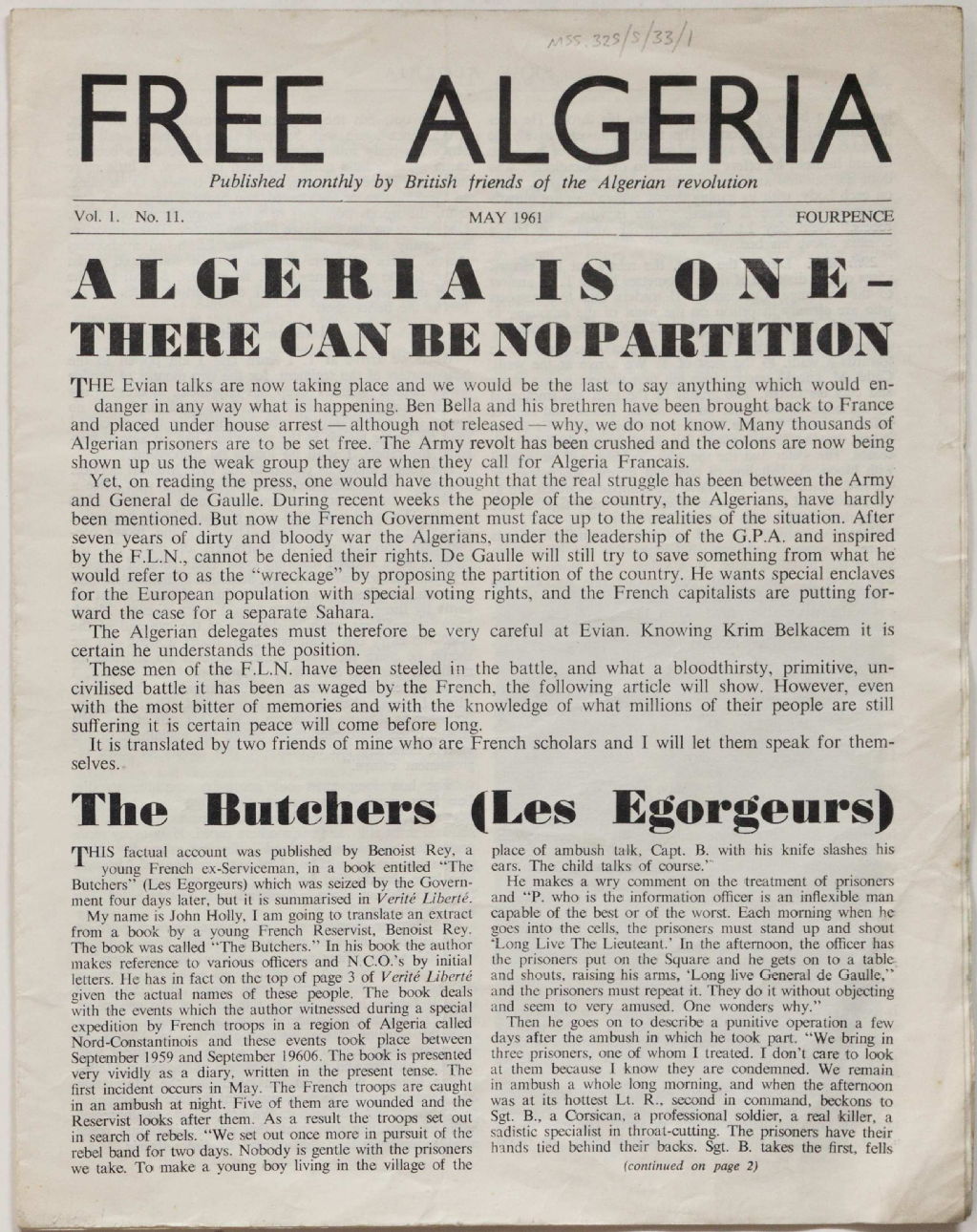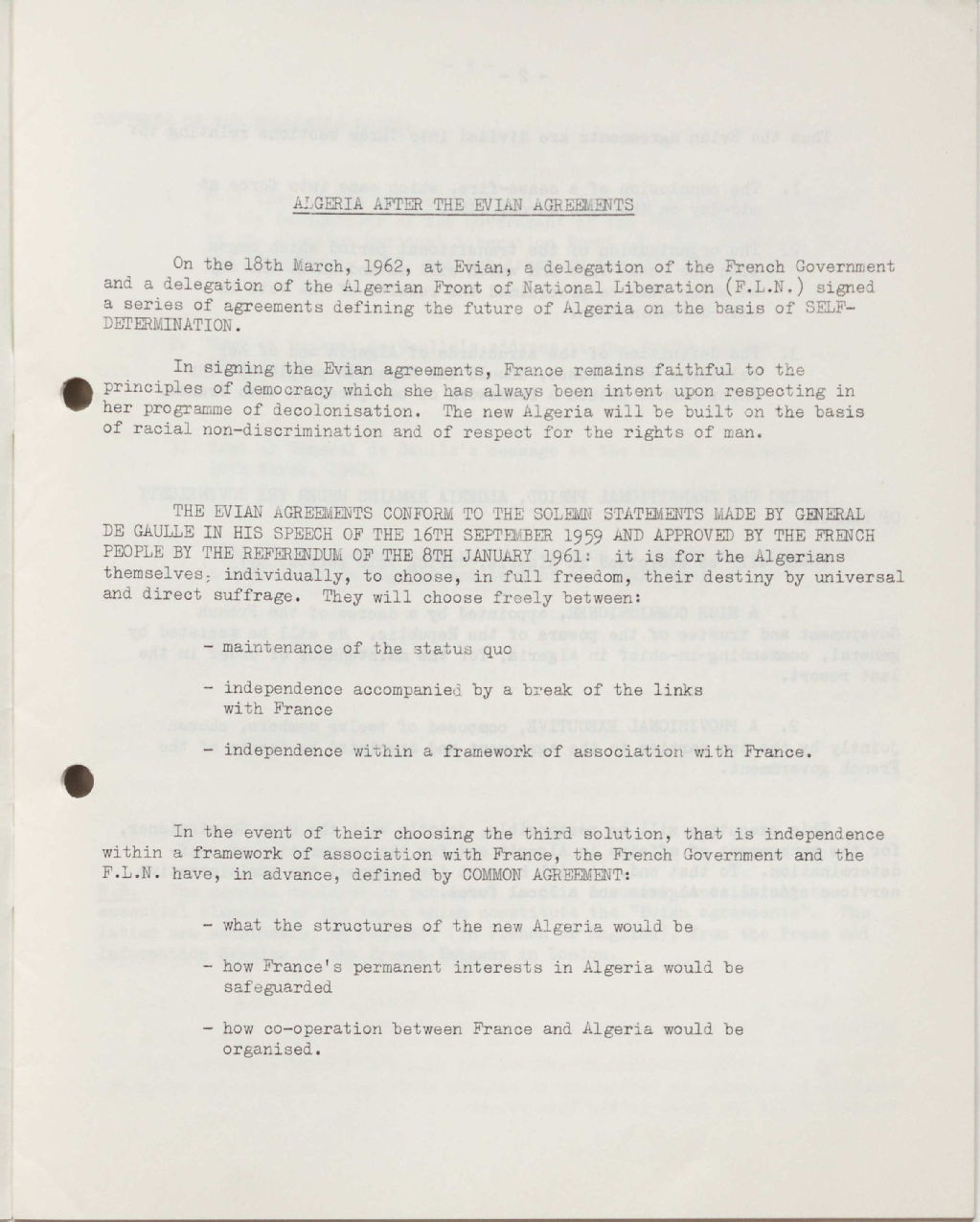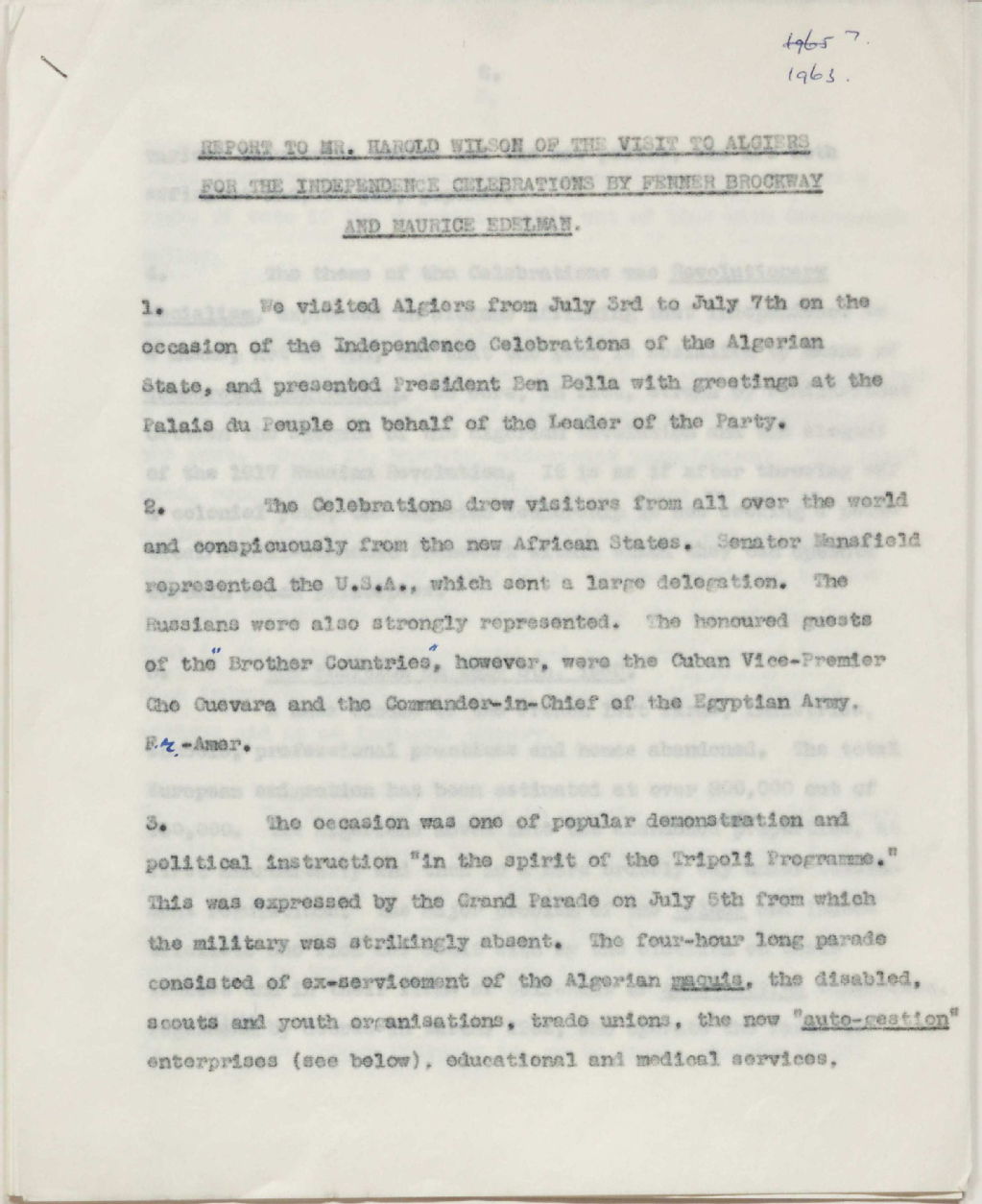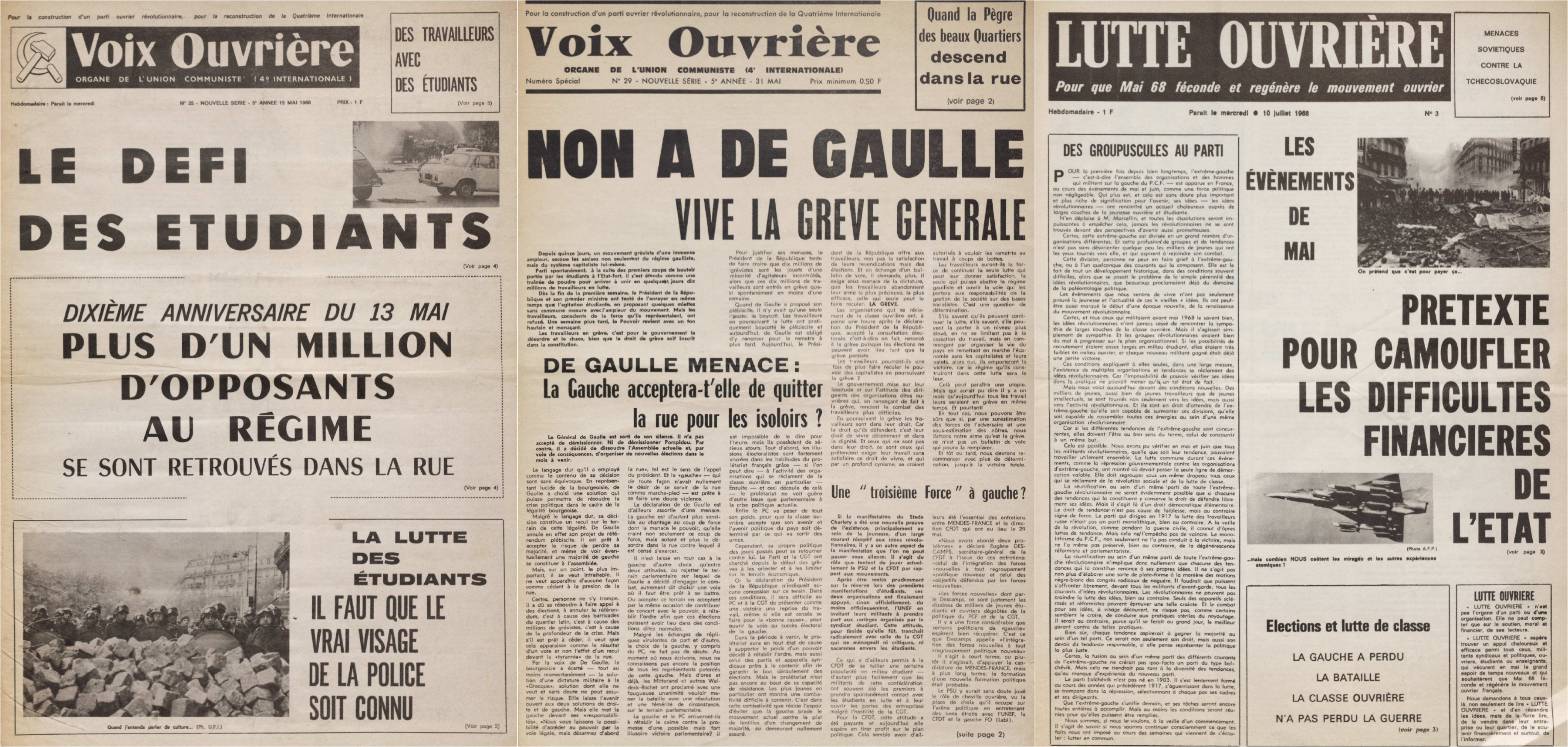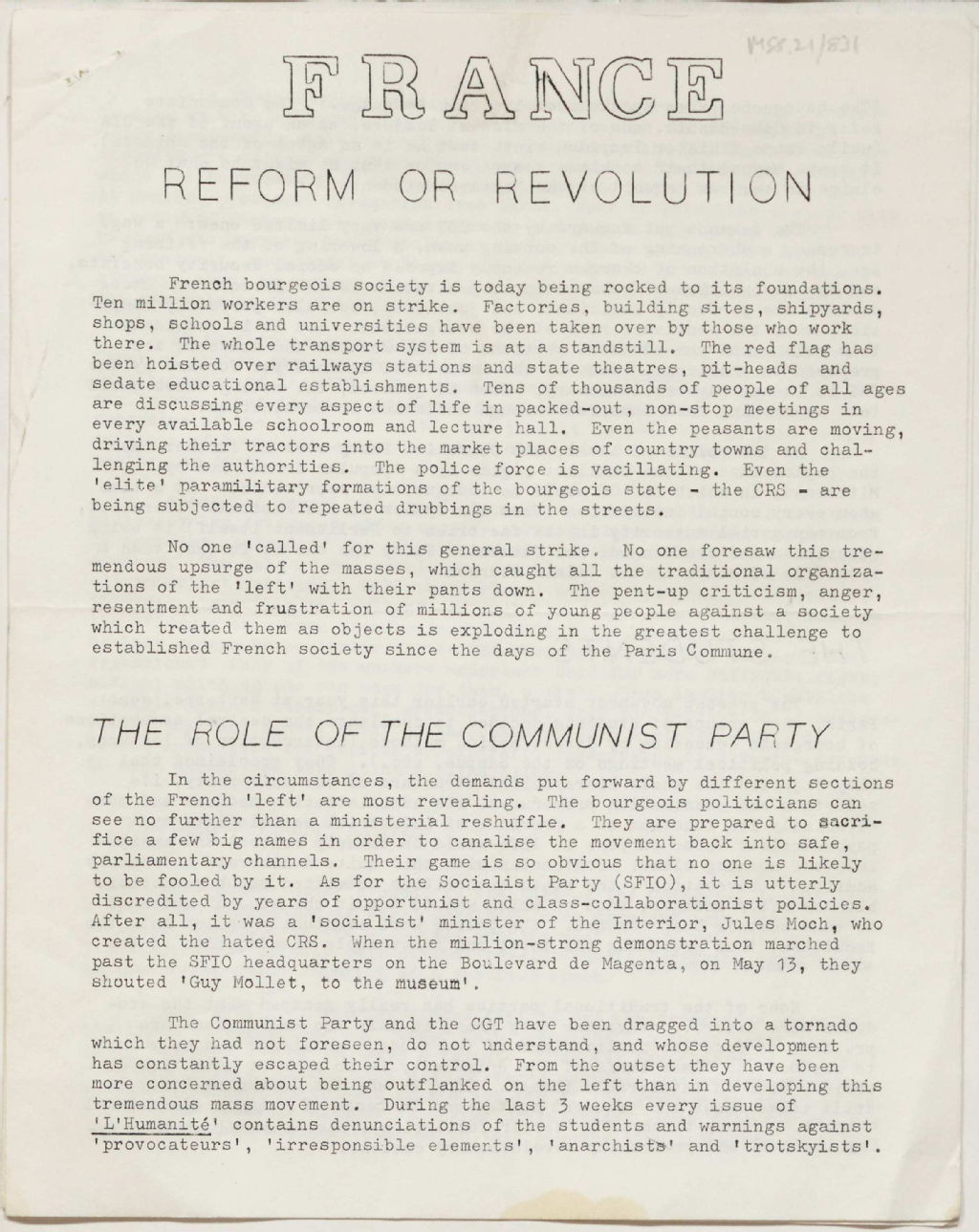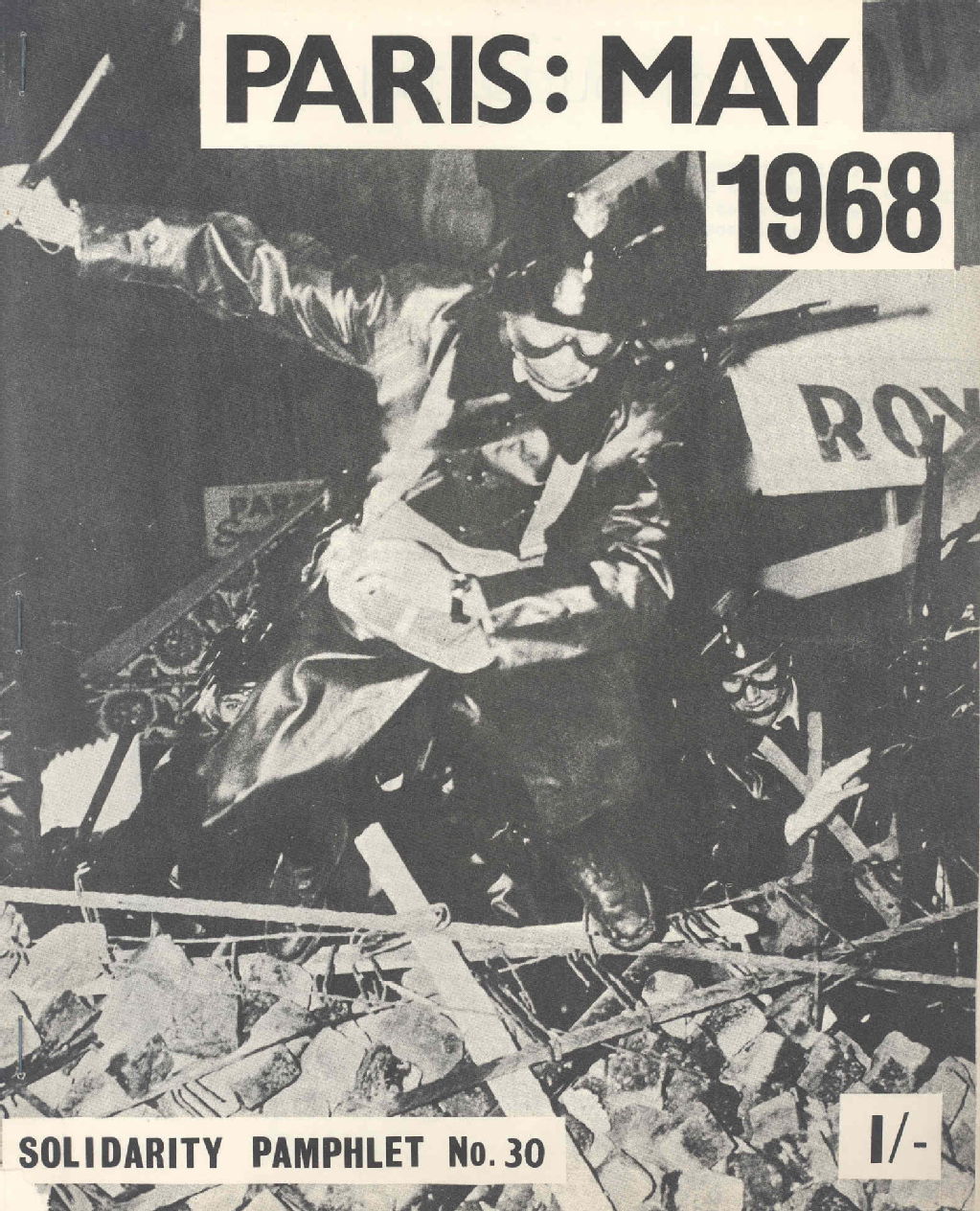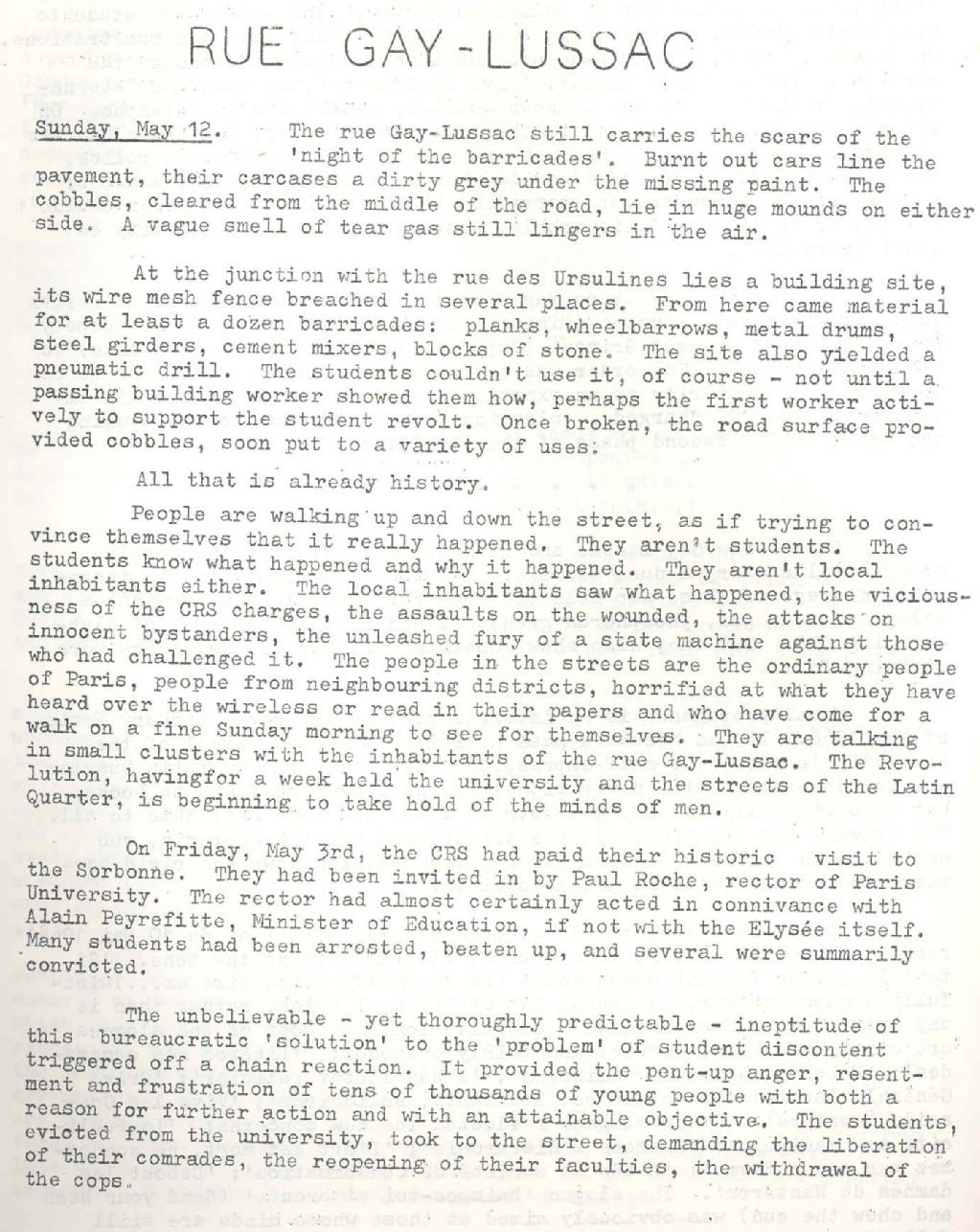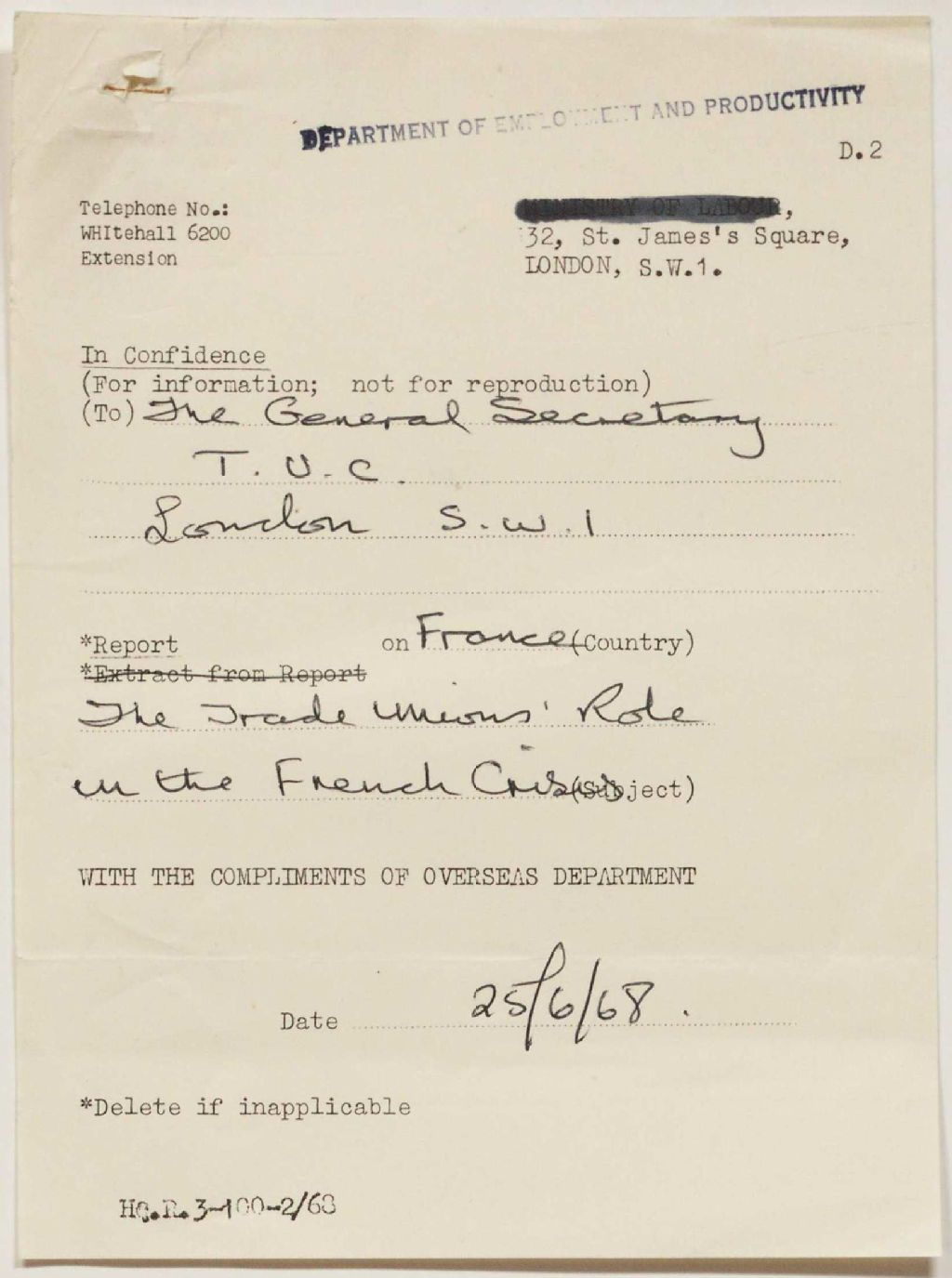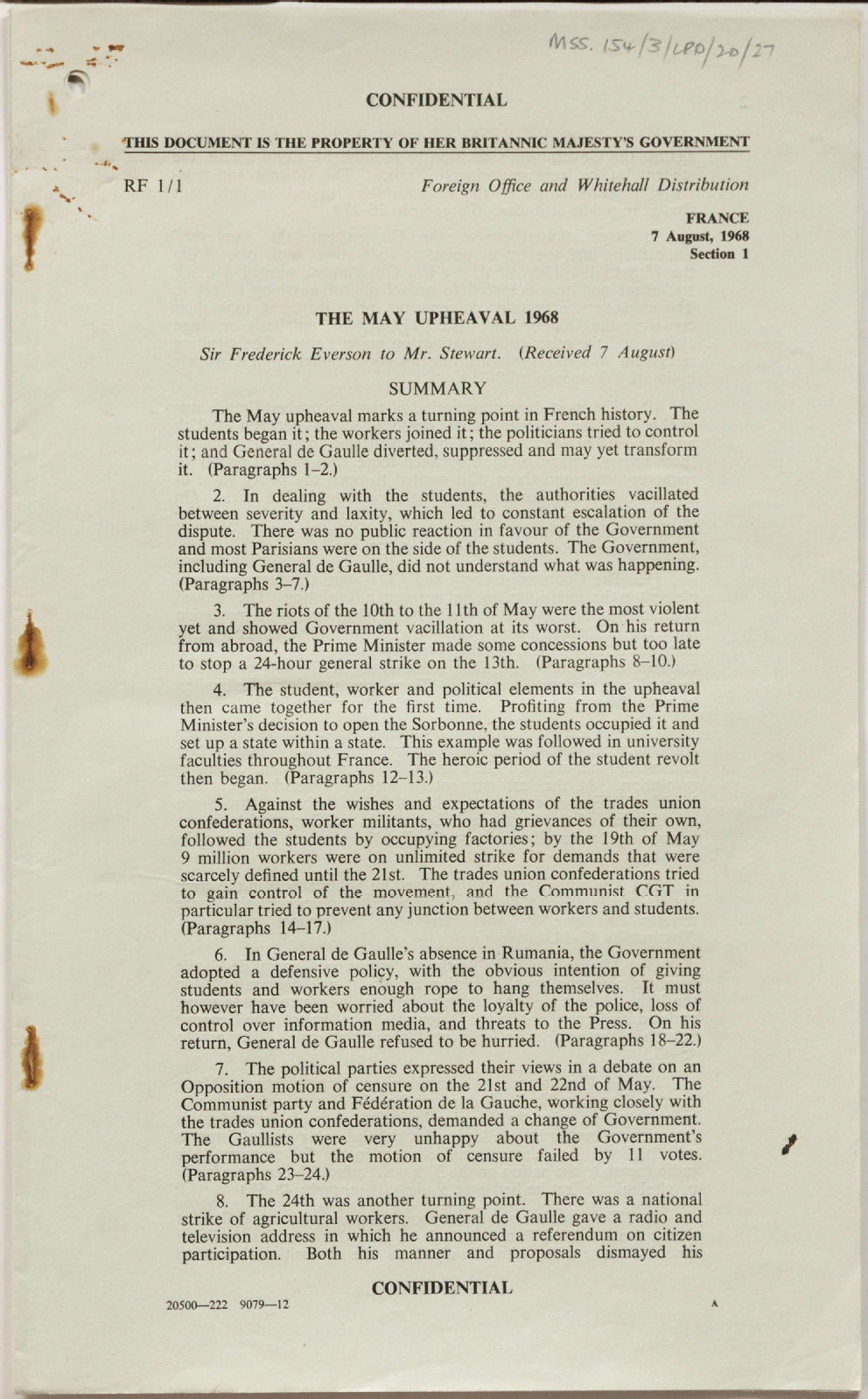History of France, 1848-1998 (HI172)
The Modern Records Centre holds nationally important collections for the study of political, social and economic history (particularly from the 20th century). Just a small selection of documents relevant to the course 'History of France, 1848-1998' are shown below, arranged into sections on 'Fascism and the Popular Front', 'Second World War: Resistance and Collaboration', 'Algeria' and 'May 1968'.
Most of the documents are available online in full - click on the thumbnail images to read the primary sources.
'Ready-made' searches of the MRC catalogue are available on the following subjects: Occupied France and the French ResistanceLink opens in a new window, France and Algerian independence, 1950s-1960sLink opens in a new window, and May 1968Link opens in a new window (these are not comprehensive lists of everything we hold on these subjects, but a selection of relevant documents).
Dr Jessica Wardaugh, reader in French Studies at the University of Warwick, has written an overview of the French collections at the Modern Records CentreLink opens in a new window in a special issue on French and British archives in the Paper Trails series of University College, London.
Interested in using primary sources in your work? - find out more about using archives
Fascism and the Popular Front
Letter on the United Front, June 1934
Copy of a letter from Victor Schiff, Paris correspondent of the 'Daily Herald'. The 'Daily Herald' was a popular pro-socialist newspaper partly funded by the Trades Union Congress (it would later be rebranded as 'The Sun'). Schiff describes the divisions in the French Socialist Party over the question of a 'United Front' with the Communists, and comments on violent clashes between Communists and supporters of far-right political parties.
Included in a file on 'International Communism: United Front', from the archives of the Trades Union Congress; document reference: MSS.292/773.9/1.
'France: The United Front', August 1934
Trades Union Congress memorandum on the agreement for political unity between the Socialist Party and Communist Party, and discussions on trade union unity between socialist and Communist groups.
Included in a file on 'International Communism: United Front', from the archives of the Trades Union Congress; document reference: MSS.292/773.9/1.
'14 Juillet [14 July]', 1935
Front page of an edition of the French newspaper 'Monde'. This issue celebrated the signing of an anti-fascist pact between the socialists and communists on Bastille Day. 'Monde' was edited by Henri Barbusse, a communist.
Included in the archive of the National Union of Teachers; document reference: MSS.179/1/13/1.
'Memorandum on French Fascism for the Editor of the Daily Herald from his Paris Correspondent', July 1935
This memorandum from Victor Schiff, Paris correspondent of the 'Daily Herald', provides a brief outline of the main French fascist organisations and gives information about their strength, core areas of support, programmes, and the motives of their supporters.
Included in a file on 'France: General', from the archives of the Trades Union Congress; document reference: MSS.292/944/1.
Summary of the results of the French elections on 26 April and 3 May 1936
The summaries include information about the number of votes cast for pro- and anti-Popular Front candidates, the differences between votes cast in the 1932 and 1936 elections, the distribution of seats between the political parties, and leading politicians.
Included in a file on 'France: Popular Front', 1936-1938, from the archives of the Trades Union Congress; document reference: MSS.292/944/18.
The foreign policy of the French government, 23 June 1936
Translation of a declaration on the foreign policy of the Popular Front government, read by Leon Blum in the Senate and Yvon Delbos in Chamber of Deputies. Less than a month after this declaration was read, the outbreak of civil war in Spain provided a major test for the French government.
Included in a file on 'France: Popular Front', 1936-1938, from the archives of the Trades Union Congress; document reference: MSS.292/944/18.
Information on the Spanish Civil War and the attitude of the French government towards it is included in Trabajadores : The Spanish Civil War through the eyes of organised labour (more than 14,000 pages of contemporary sources on the conflict)
'Situation in France': Paris strikes, 12 June 1936
Letter from George Stolz, Assistant Secretary of the International Federation of Trade Unions, to Walter Citrine, General Secretary of the Trades Union Congress. Stolz describes the role of the Communists in Paris strikes ("more as a break than a motive force") and the public reaction to the industrial unrest.
Included in a file on 'France: Popular Front', 1936-1938, from the archives of the Trades Union Congress; document reference: MSS.292/944/18.
France revisited: An examination of her political, economic and social conditions in February 1938
Report of an investigation into conditions in France during early 1938, shortly after the formation of the second Chautemps Government. The investigation was conducted by J. Baker White, the Director of the Economic League (a British pressure group or think tank on the right of the political spectrum). The pamphlet includes a diary of key events in France between 1934 and 1938.
From the Maitland Sara Hallinan collection; document reference: MSS.15X/2/144/2.
Notes on the political situation, 23 March 1938
Copy of a letter sent to William Gillies, International Secretary of the British Labour Party, from Victor Schiff, Paris correspondent of the 'Daily Herald'. Schiff describes the position of the new Blum Cabinet, the splits within the Popular Front, and "the degree of demoralisation in French political quarters".
Included in a file on 'France: Popular Front', 1936-1938, from the archives of the Trades Union Congress; document reference: MSS.292/944/18.
Another letter from Schiff, written a month later, is also available onlineLink opens in a new window.
Communist activity in France, March 1940
Translation of a letter from Paul Faure, French socialist politician and former Popular Front minister, refuting Communist allegations that "that France is a semi-fascist country, where all liberties have been abolished, where parliamentary government no longer exists, where the Trade Unions have been suppressed and their leaders imprisoned".
Included in a file on 'France: Second World War', 1939-1941, from the archives of the Trades Union Congress; document reference: MSS.292/944/19.
An example of the anti-French government propaganda produced by the Communist Party - What is happening in FranceLink opens in a new window by Isabel Brown - is also available online.
Second World War: Resistance and Collaboration
Short video on an exhibition on occcupied FranceLink opens in a new window curated by students studying the Right in France module (FR 257).
Manifesto to the French workers, 31 May 1940
Translation of manifesto issued by the trade union organisation Confédération Générale du Travail during the German invasion of France and the Low Countries. It calls for workers to stay in their workplace and increase production to help fight the invading army.
Included in a file on 'France: Second World War', 1939-1941, from the archives of the Trades Union Congress; document reference: MSS.292/944/19.
'What happened on the "Massilia", 1940
14 page report written by Max Braun, following his arrival in London. The ship 'Massilia' had carried French parliamentarians from France to North Africa shortly before the capitulation of France and establishment of the Vichy Government. Braun argues that political opponents of Marshal Petain were tricked into leaving, so that they could subsequently be attacked as traitors or cowards.
Included in a file on 'France: General', from the archives of the Trades Union Congress; document reference: MSS.292/944/1.
'We accuse': Manifesto of the Communist Party of France, April 1940
Communist Party manifesto published in the journal of the Communist International (or Comintern). It includes an attack on the government of Daladier and the "French bourgeoisie" or middle classes, who the manifesto claimed had "contributed to the outbreak of the present war [and] by their imperialist and reactionary policy paved the way for the invaders".
From the Maitland Sara Hallinan collection; document reference: MSS.15X/1/54/237.
A Communist Party of France manifesto from January 1944, which focuses more on the resistance movement, is also available onlineLink opens in a new window.
'Open letter to British workers', 17 June 1940
Statement from "a group of French Internationalist Communists, partisans of the Fourth International" (e.g. French Trotskyists). They accuse the French Government and capitalist class of prefering to hand over their country to the Germans rather than "arm the workers" to defend it.
From the archives of Jimmy Deane, Trotskyist; document reference: MSS.325/1/A40(11).
A similar statement on 'The capitulation of the French bourgeoisie' is also available onlineLink opens in a new window.
Statement made on the French trade union movement and the fall of France, 5 December 1940
Statement made by Walter Schevenels, General Secretary of the International Federation of Trade Unions, to the International Committee of the British Trades Union Congress. The document includes a description of the situation at the time of the fall of France, the reasons why "the June capitulation was unavoidable", and divisions in the Vichy Government. Schevenels also refers to his own escape from France. The document is heavily annotated, with some of the more sensitive or contentious passages marked for deletion.
Included in a file on 'France: Second World War', 1939-1941, from the archives of the Trades Union Congress; document reference: MSS.292/944/19.
To the workers of France, 22 May 1941
Translation of a leaflet issued by the Jean-Jaures Group of French Socialists in Britain. It attacks the Vichy government for allowing German forces to use French bases in Syria, thus "handing over to the enemy the Empire just as they have already delivered Metropolitan France", and calls for French workers to "build up in secret the front of resistance!".
Included in a file on 'France: Second World War', 1939-1941, from the archives of the Trades Union Congress; document reference: MSS.292/944/19.
'Extract from report of a trade union leader active in the resistance movement, made July, 1941'
The anonymous trade unionist discusses "the men behind resistance" and "collaborators" within the labour movement. The English translation was made in November 1944, around the time of a joint meeting of the British Trades Union Congress and the French Confederation Generale du Travail.
Included in a file on France, 1944-5, from the archives of the Trades Union Congress; document reference: MSS.292C/944/3.
Statement by General Charles de Gaulle, 25 June 1942
Statement on the war and post-war policy made by General de Gaulle following consultation with the underground organisations in France. It was intended to form the basis of an agreement between the different groups and was published in underground newspapers in both occupied and Vichy France.
Included in a file on 'France: General', 1935-1945, from the archives of the Trades Union Congress; document reference: MSS.292/944/1.
'France's uncensored press', December 1942
This booklet contains English translations of nine bulletins issued by French resistance groups between November 1941 and September 1942.
A similar booklet, 'Resistance in FranceLink opens in a new window', contains translated bulletins from 1943 and is also available online in full.
From the archives of Jimmy Deane, Trotskyist; document reference: MSS.325/57/Y40/24.
Examples of visual propaganda, c.1942-3
Cartoon attacking the German occupation and the actions of French collaborators. 131 French resistance bulletins and leafletsLink opens in a new window have also been digitised and can be seen through our online catalogue.
Included in file on the French underground, from the archives of the International Transport Workers' Federation; document reference: MSS.159/3/C/A/118.
'The situation in France', April 1943
Intelligence report included in the archives of the International Transport Workers' Federation. It includes observations on collaborators, sabotage and resistance, the mood of occupying troops, and French workers' opinions of political leaders and post-war aspirations.
Included in a file on the French underground, from the archives of the ITF; document reference: MSS.159/3/C/A/118.
Programme du Conseil National de la Résistance (C.N.R.), [1944]
Published programme of action (in French) of the National Council of the Resistance, adopted on 15 March 1944. The Council acted as a co-ordinating body for the various resistance organisations and had been formed at the instigation of General de Gaulle.
Included in a file on 'France: General', 1935-1945, from the archives of the Trades Union Congress; document reference: MSS.292/944/1.
'It happens in Normandy', July 1944
Illustrated report on the ritual humiliation of female collaborators after the liberation of Normandy, published in the British newspaper the 'Daily Herald'. It condemns the scenes as recalling "the exhibitionist "punishments" which were popularised by the Nazis in Germany".
Included in a file on 'France: General', 1935-1945, from the archives of the Trades Union Congress; document reference: MSS.292/944/1.
'With the French Resistance', 1945
Recollections of a female member of the French Resistance in Paris, published in the October 1945 issue of 'The Blue Triangle', the magazine of the Young Women's Christian Association (YWCA). She describes her work in different sections of the Resistance during 1943 and 1944, including distribution of propaganda, provision of supplies to those in hiding, collection of information and sabotage through placing of explosives.
Included in the archive of the YWCA; document reference: MSS.243/1/11/9/1.
The situation in France and proposals of the delegation of the Confederation Generale du Travail to increase the war effort of their country, 1945
Memorandum by the French trade union organisation Confederation Generale du Travail on the economic and industrial state of France after liberation. It includes an appeal for France's "Anglo-Saxon allies" to not just use the country as "a battleground and a strategic route", but to provide assistance so that it "can still play an important part in the fight against Hitler, both from an economic and a military point of view". An appendix provides a summary of the amount of food (and wine) available to citizens under rationing.
Included in a file on 'France: General', 1935-1945, from the archives of the Trades Union Congress; document reference: MSS.292/944/1.
Algeria
'Sauvons les condamnes a mort d'Algerie', 1955
This French leaflet contains a protest or appeal against the death sentences given to leading Algerian nationalists, including Mostefa ben Boulaid and Ahmed Bouchemal, and announces a protest meeting to be held in Paris on 8 November 1955. Signatories to the protest include leading political, academic and cultural figures (including the writer Albert Camus).
From the archive of Henry Sara and Frank Maitland; document reference: MSS.15B/7/154.
'Essential notions about Algeria', [1957]
Algerian government publication which includes general information about the country and promotes the reforms and security measures of the French colonial government. It includes short sections on 'The rebellion', 'The work of pacification', and political, social and agrarian reforms in Algeria.
Included in a file on North Africa, 1956-1960, from the archives of the Trades Union Congress; document reference: MSS.292/964.1/2.
'The Algerian Rebellion', March 1958
Three articles from The Times which have been circulated as a press release by the French Embassy in London. The articles - 'Nationalists go to extremes', 'Reforms against the clock' and 'Muslim opinions on France' - include information and opinion on the Algerian independence movement and the French response.
Included in a file on North Africa, 1956-1960, from the archives of the Trades Union Congress; document reference: MSS.292/964.1/2.
'Mission to Tunisia - Algerian Refugees', April 1958
Press release and report issued by the International Confederation of Free Trade Unions (ICFTU) following the return of its representatives from visits to refugee camps along the Tunisian - Algerian border.
Included in a file on North Africa, 1956-1960, from the archives of the Trades Union Congress; document reference: MSS.292/964.1/2.
'How the referendum is organised in Algeria', 20 August 1958
Statement issued by the London delegation of the Algerian Front of National Liberation on the French constitutional referendum held in 1958 to approve the Fifth Republic. The FLN called on all Algerians to boycott the referendum.
Included in a file on North Africa, 1956-1960, from the archives of the Trades Union Congress; document reference: MSS.292/964.1/2.
Protest against the "accidental" death of Aissat Idir in French custody, 1959
Leaflet and circulars in English, French and Arabic issued by the Union Générale des Travailleurs Algériens after the murder of their secretary general, Aissat Idir. On leaving prison after being found not guilty of the charge of "menacing the external security of the (French) State", the trade union leader was abducted by French military authorities and subsequently died under torture.
Included in a file on North Africa, from the archives of the TUC; document reference: MSS.292/964.1/2.
Declaration of Messali Hadj in response to General De Gaulle's statement on Algeria, September 1959
The declaration comments on the rise of Algerian nationalism and De Gaulle's proclamation of the right of self-determination. It was circulated by the London Office of the Algerian National Movement (MNA).
Included in a file on North Africa, from the archives of the TUC; document reference: MSS.292/964.1/2.
'Free Algeria', volume 1, number 11, May 1961
'Free Algeria' was a British journal edited by the Labour Party MP John Baird. The journal included articles by Algerian politicians and French writers, reports on the situation in Algeria and persecution of Algerians in France, and articles on broader issues such as Arab Unity and women in Islam. This particular issue includes comment on the Evian talks and proposals to divide Algeria (with the oil-rich areas of the Sahara being retained by France), and explicit descriptions of atrocities by French soldiers.
From the archives of Jimmy Deane, Trotskyist; document reference: MSS.325/S/33. Other issues of 'Free Algeria' are included in the archives of Militant Tendency; document reference: 601/R/21/9.
'Algeria: After the Evian Agreements', 1962
This booklet, issued by the French Embassy in London, provides an outline of the agreements made between representatives of the French Government and the Algerian Front of National Liberation (F.L.N.) at Evian on 18 March 1962. It also includes the text of two speeches made by General de Gaulle to the French people and parliament following the agreements.
Included in a file on North Africa, from the archives of the Trades Union Congress; document reference: MSS.292B/964.1/2.
Report on the Algerian independence celebrations, 1963
This report was written by the British Members of Parliament Maurice Edelman and Fenner Brockway for Harold Wilson, leader of the Labour Party. It includes a description of the independence celebrations and comments on the wider social and political situation in the country.
Included in a file on Algeria, from the papers of Maurice Edelman; document reference: MSS.125/1/3/6.
Maurice Edelman wrote widely on France and French politics. His articles include 'Algiers: Where France is being reborn' from the magazine 'Picture Post' (on the French Government in exile), 17 Jun 1944 [document reference: MSS.125/1/3/38/1].
May 1968
Examples of front pages of 'Voix Ouvrière' ('Workers' Voice') and 'Lutte Ouvrière' ('Workers' Struggle'), May and July 1968
'Voix Ouvrière', a French Trotskyist newspaper, was banned because of its support of the student revolt in May 1968. It relaunched in June 1968 under the name 'Lutte Ouvrière'.
Included in the papers of Colin Barker; document reference: MSS.152/3/1 and MSS.152/3/2.
Examples of posters produced around May 1968
The images were included in issues of the Trotskyist newspaper 'Lutte Ouvrière'.
Included in the papers of Colin Barker; document reference: MSS.152/3/2.
'France: Reform or Revolution?', c. May 1968
Leaflet produced by the British left-wing group Solidarity. It looks at the role of the students, and attacks the actions of the Communist Party and the Trotskyist groups (demonstrating some of the divisions in the revolutionary left at the time).
From the 'Miscellaneous Collection'; document reference: MSS.21/831.
'Paris: May 1968'
Extract from a pamphlet which contains an eyewitness account of the events in Paris during May 1968. It was published by 'Solidarity', "a paper for rank and file militants".
Included in the papers of Bob Purdie, Trotskyist; document reference: MSS.149/2/12/14/4.
'The trade unions' role in the French crisis', 25 June 1968
Extract from a private report sent by the (British Government) Department of Employment and Productivity to the Trades Union Congress. It summarises the changing behaviour of the French trade unions during four phases of the crisis, including their attitudes towards the protesting students, and contrasts the "negative" actions of the Communist C.G.T. with those of the "militant" C.F.D.T.
Included in a file of Ministry of Labour / Department of Employment reports on industrial relations in France, from the archives of the TUC; document reference: MSS.292B/944/3.
'The May upheaval 1968', 7 August 1968
"May 1968 is already immortal in French history. In the space of a month, France was swept to the brink of a revolution, disliked what she saw over the edge, and recoiled in obedience to the sound of the old master's voice": Confidential British government report on the events in Paris during May 1968, written by Sir Frederick Everson of the British Embassy in Paris. The report includes a detailed analysis of the events, the actions of the French government and other political groups, and potential consequences of the unrest.
Included in the papers of Richard Crossman MP; document reference: MSS.154/3/LPO/20/27-36.

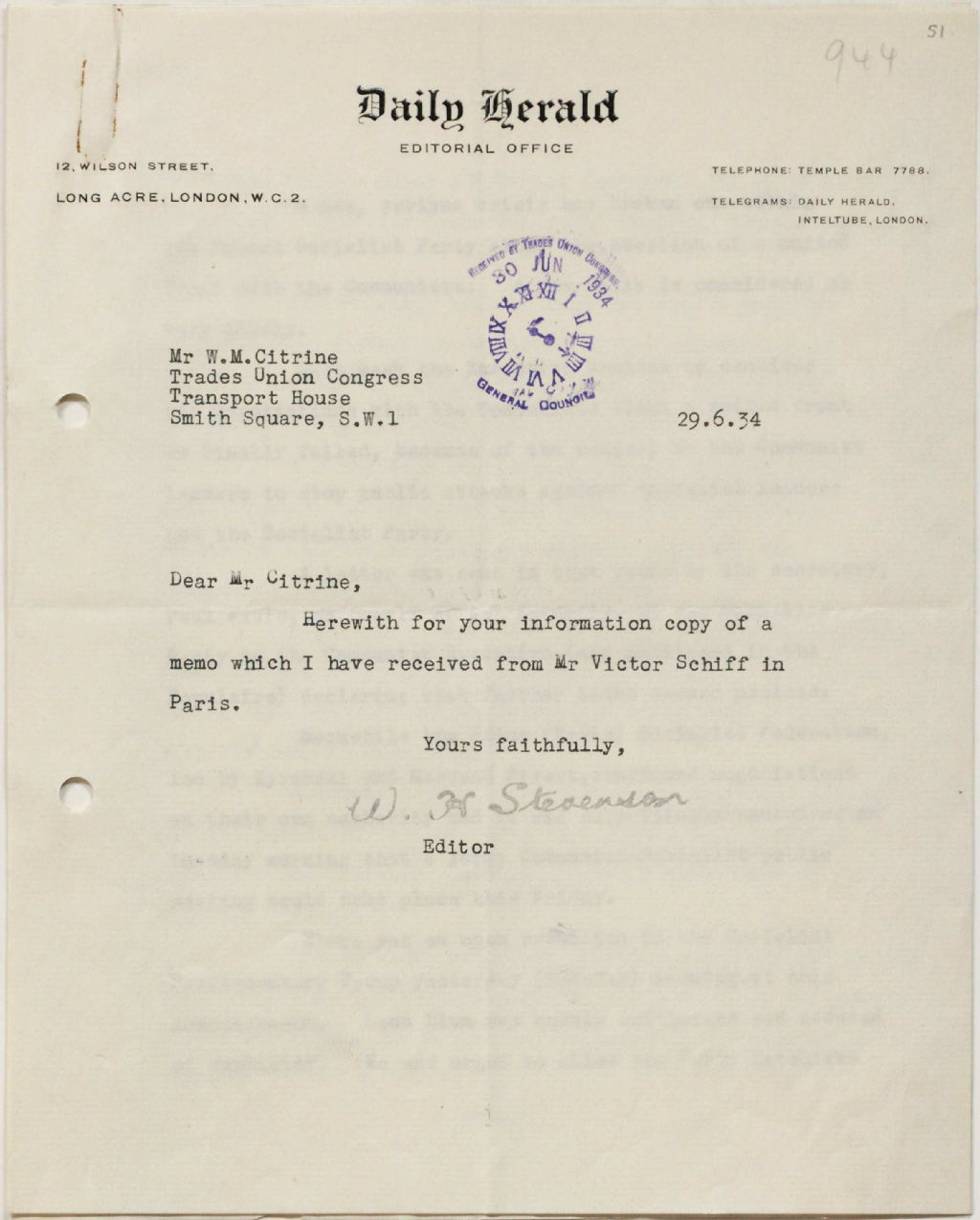
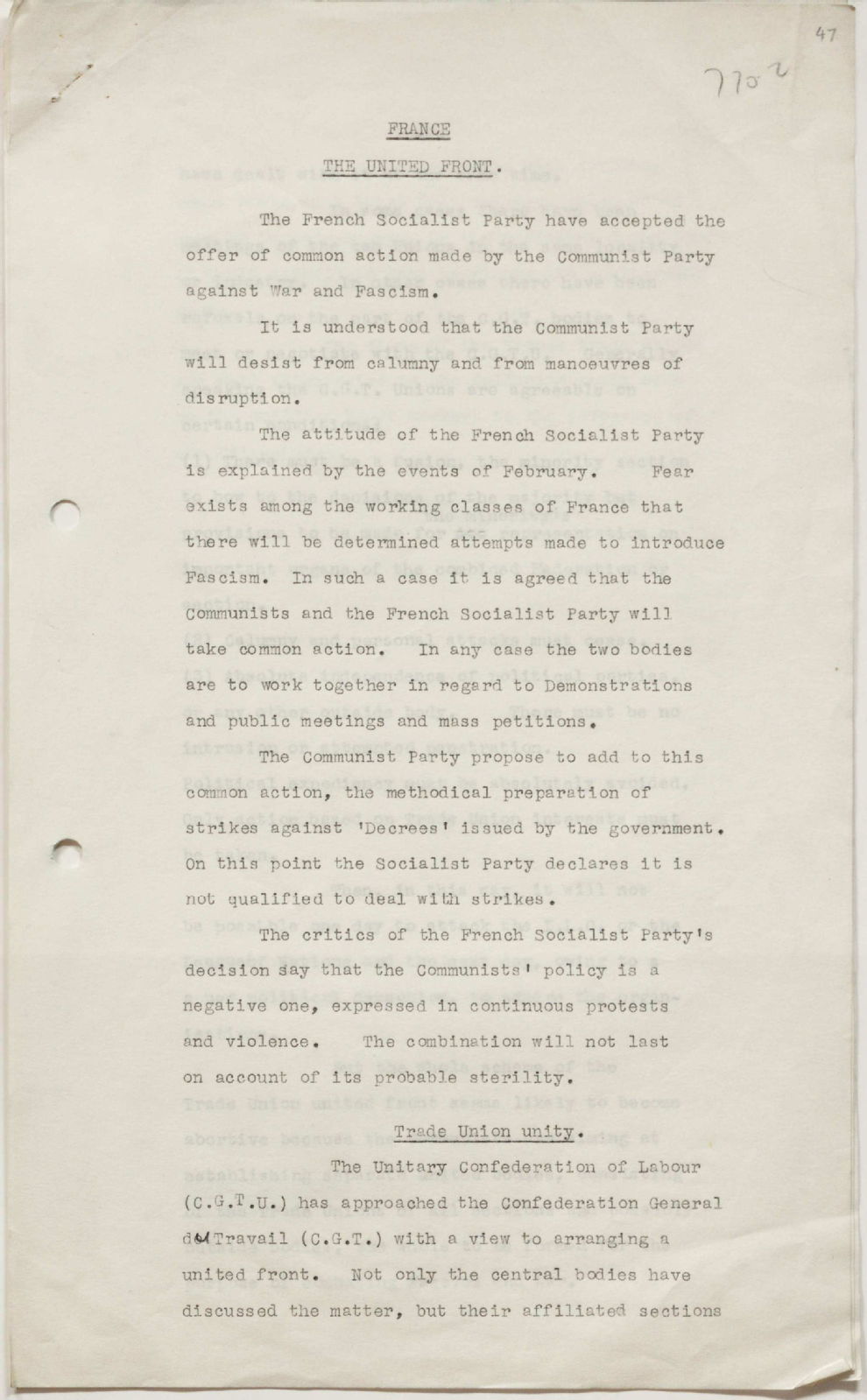
!['14 Juillet [14 July]', 1935](1-13-1a.jpg?)
